













By David Rullo | Pittsburgh Jewish Chronicle
Jewish Federation of Greater Pittsburgh Community Security Director Shawn
Brokos met earlier this month with more than 50 Jewish leaders from across the region to give her annual security assessment, looking back on 2024 and providing a glimpse into what the community can expect in 2025.
There were 283 antisemitic incidents reported to Pittsburgh’s Federation in 2024, Brokos reported, down from 300 in 2023. Those numbers, though, come with a caveat.
Brokos said 2023 was a high-water mark in antisemitic activity. The spike was originally believed to be associated with the conclusion of the Pittsburgh synagogue shooting trial.
“We thought we would see a plateau,” Brokos said, “and then Oct. 7 hit.”
After the terrorist group Hamas invaded Israel, there was a surge of incidents reported to the Federation.
“We saw a 30% increase from just Oct. 7 to Dec. 31, 2023, and then, what we’ve seen is a continued high pace of incidents,” Brokos said. “I think 300 is our new normal.”
Incidents that garnered attention this year included attacks on Jewish students
at the University of Pittsburgh; the arrest of an Upper St. Clair resident who tried to join Hezbollah; anti-Zionist graffiti painted on the buildings of Chabad of Squirrel Hill, Federation and at private residences; and the theft of a plaque at Taylor Allderdice High School that was dedicated to the victims of the Pittsburgh synagogue shooting.
Several high-profile arrests were made in 2024, including that of two people who spray painted anti-Zionist graffiti at Chabad of Squirrel Hill and the Federation, and former City of Pittsburgh employee Mario Ashkar on ethnic intimidation charges.
Brokos said the arrests show the continued partnership between community members and law enforcement.
To that end, 2024 saw the creation of Federation’s Virtual Block Watch, a network of community members who have registered their residents as locations with cameras and agreed to provide video to law enforcement and the Federation if needed.
The program, Brokos said, provided valuable information when Chabad of Squirrel Hill was vandalized.
In addition to the Virtual Watch Program, Brokos said Federation increased training
By David Rullo | Senior Staff Writer
ittsburgh City Council has passed two pieces of legislation it hopes will prevent groups like Not On Our Dime from introducing referendums that would prevent the city from doing business with Israel or any company conducting business with the Jewish state.
The two ordinances, which would add questions to the May 20 ballot, were approved during a Feb. 4 regular council meeting.
The first ordinance asks voters to decide if Pittsburgh’s Home Rule Charter should be amended to prohibit discrimination “on the basis of race, religion, ancestry, sex, sexual orientation, age, gender identity or expression, disability, place of birth, national origin or association or affiliation with any nation or foreign state in conducting business of the City.”
It was approved unanimously by the council.
The second ordinance asks voters if the Home Rule Charter should be amended to prohibit “the use of the Home Rule Charter Amendment process to add duties or obligations beyond the lawful scope of the city’s authority.”
It was approved by a vote of 6-2. Councilmember Deb Gross, District 7, voted no. Councilmember Barb Warwick, District 5, which includes Squirrel Hill, attempted to abstain but her vote was recorded as a no vote because, according to council rules, in a final vote an abstention is recorded as a no vote.
Warwick attempted to explain her vote by saying she was concerned about the current federal government and the effects of the bill.



By Adam Reinherz | Senior Staff Writer
Regional college students seeking information about Israel have a new resource.
Libby Cohen, a self-described social justice advocate, recently joined StandWithUs as its Mid-Atlantic campus regional manager. Since assuming the role two weeks ago, Cohen, 26, has begun orienting herself to campus realities in Pennsylvania, Delaware, Virginia, West Virginia, Maryland and Washington, D.C.
The former Florida resident works with 10 campuses and 11 fellows to provide information and resources for events and programs geared toward combating antisemitism and promoting Israel education.
“I am kind of just like a support system,” she said. “If they need anything, I am always there.”
Before beginning the StandWithUs role two weeks ago, Cohen worked for Project 26 Pennsylvania, a nonprofit committed to increasing young voter turnout. As a campus organizer with Project 26, Cohen managed 10 fellows and volunteers tasked with motivating Carnegie Mellon University students.
“That kind of opened my eyes to what is happening at the University of Pittsburgh, and all these other schools,” said Cohen, who added that in the years since graduating college she fell “out of the know” regarding campus life.
After graduating from Dickinson College with a degree in political science and government in 2021, Cohen joined Americorps. She spent a year teaching English to middle school students in Jacksonville, Florida, before traveling to Bengkulu, Indonesia, where she taught for another year.
Teaching abroad left her largely “ignorant” about Jewish life on U.S. college campuses, she said. “I wanted more information about it.” Cohen’s mother suggested participating in Birthright. So last June, one month before moving to Pittsburgh to join Project 26, Cohen spent 10 days in the Jewish state.
“I learned a ton about Israel’s history and

how that is transpiring, present-day, with Gaza,” she said. Speaking with Israelis her age offered insight on Israel’s challenges on “different fronts,” as well as “how the people are coping, and just focusing on life and living through all these terrible times.”
Though Birthright was not her first trip to Israel — Cohen previously visited an uncle in Herzliya and participated in synagogue trips — the 10-day excursion was an eye-opening endeavor.
“I’m just so grateful that I can bring that back to the U.S. and tell people about it,” she said.
Working with StandWithUs is similar to teaching English, as both rely on a strong commitment to education and relationship building, Cohen explained.
Part of “making people aware of something that they weren’t aware of” requires trust between parties, she said, adding that establishing partnerships with students, parents and administrators looks different across the region. “Some campuses are much more open, and kind of friendlier in a way. Everybody has a different perspective on everything that’s going on within Israel and with the Middle East.”
Cohen told the Chronicle she’s committed to “knowing the facts, and knowing what is actually happening on campus.”
Following heightened hostilities post-Oct. 7, Brandeis University’s Cohen Center for Modern Jewish Studies reported last year that

“although a majority of students are not hostile to Jews or Israel, colleges and universities need to recognize that there is a minority of students who are contributing to a hostile environment for Jewish students on campus.”
A Newsweek/College Pulse survey released in May 2024 found that 80% of college students in the U.S. “don’t approve of Israel’s handling of the war against Hamas in Gaza.”
As for Jewish students on campus, new data from Prizmah released last week notes that “compared to peers who did not attend Jewish day school, Jewish day school alumni consistently report stronger ties to their Jewish identity, a deeper connection to Israel and greater participation in Jewish life during their college years.”
Cohen said she’s eager to learn more about the nuances of student life in the region and that the same thirst for teaching that led her to Asia is driving her desire to be a resource here.
As an educator, “having open discussions is extremely important,” she said. So is “knowing what the other side thinks.”
People who follow news about college life may notice headlines promoting fear, “but you also have to look on the brighter side and be like, students want to learn about this,” Cohen said. “They are passionate about it. So how can we create [something] in a more educational-based mindset instead of just hopping on a bandwagon of TikTok or other social media?”
Today’s college students belong to a generation

SUBSCRIPTIONS
subscriptions@pittsburghjewishchronicle.org 412-687-1000, ext. 2
TO ADVERTISE
advertising@pittsburghjewishchronicle.org 412-687-1000, ext. 1
EDITORIAL DEPARTMENT
Email: newsdesk@pittsburghjewishchronicle.org
BOARD OF TRUSTEES
Evan H. Stein, Board Chair
Gayle R. Kraut, Secretary
Evan Indianer, Immediate Past Chair
Gail Childs, Dan Droz, Malke Steinfeld Frank, Seth Glick, Tammy Hepps, Judith Kanal, Cátia Kossovsky, Charles Saul, Derek Smith
GENERAL COUNSEL
Stuart R. Kaplan, Esq.
Jim Busis, CEO and Publisher 412-228-4690 jbusis@pittsburghjewishchronicle.org
EDITORIAL
Toby Tabachnick, Editor 412-228-4577 ttabachnick@pittsburghjewishchronicle.org
Jarrad Saffren, Contributing Editor
Adam Reinherz, Senior Staff Writer 412-687-1000 areinherz@pittsburghjewishchronicle.org
David Rullo, Senior Staff Writer 412-687-1000 drullo@pittsburghjewishchronicle.org
ADVERTISING
Amy Weiss, Account Executive (412) 613-0697 aweiss@pittsburghjewishchronicle.org

that wants to “directly make an impact,” she continued. “I think that is extremely significant in how we curate this specific kind of curiosity. We have to give them the correct information where they can form their own opinion.”
Whether it’s providing speakers, pamphlets or digital guides, StandWithUs has the ability to meet different student needs, Cohen said. Increasing information is critical to generating “more dialogue on campus and creating more well-rounded mindsets of the student body … So many students are feeling ostracized now, and that is not OK. Every single college student should have a safe space on campus — whether that is Hillel, Chabad, whether that’s a professor or a class, or the dining hall or wherever — it should feel safe for them.”
Thr ough her new position with StandWithUs, Cohen is committed to aiding learners and educating “every single college student about what is actually happening in Israel, while also obviously combating antisemitism and anti-Israel activity on campus,” she said. “I want students to know that people are supporting them, even if they don’t know that they’re supporting them. People are working towards bettering our communities and trying to provide a more basic foundation of just literally getting the facts out.” PJC
Adam Reinherz can be reached at areinherz @pittsburghjewishchronicle.org.
5915 Beacon St., 5th Floor Pittsburgh, PA 15217
Main
PRODUCTION Jeni Mann Tough Production Manager Carl Weigel Art/Production Coordinator Subscriptions subscriptions@pittsburghjewishchronicle.org 412-687-1000, ext. 2
Published every Friday by the Pittsburgh Jewish Publication and Education Foundation 5915 Beacon St., 5th Floor Pittsburgh, PA 15217
Phone: 412-687-1000
POSTMASTER: Send address change to PITTSBURGH JEWISH CHRONICLE, 5915 BEACON ST., 5TH FLOOR PITTSBURGH, PA 15217 (PERIODICAL RATE POSTAGE PAID AT PITTSBURGH, PA AND AT ADDITIONAL MAILING OFFICES) USPS 582-740

Manuscripts, letters, documents and photographs sent to the Pittsburgh Jewish Chronicle become the property of this publication, which is not responsible for the return or loss of such items.
The Pittsburgh Jewish Chronicle does not endorse the goods or services advertised or covered in its pages and makes no representation to the kashrut of food products and services in said advertising or articles. The publisher is not liable for damages if, for any reason whatsoever, he fails to publish an advertisement or for any error in an advertisement. Acceptance of advertisers and of ad copy is subject to the publisher’s approval. The Pittsburgh Jewish Chronicle is not responsible if ads violate applicable laws and the advertiser will indemnify, hold harmless and defend the Pittsburgh Jewish Chronicle from all claims made by governmental agencies and consumers for any reason based on ads appearing in the Pittsburgh Jewish Chronicle

By Adam Reinherz | Senior Staff Writer
Justin Rubenstein took the plunge. Last week, following a year of studying about Judaism and a lifetime pondering his relationship to the faith, Rubenstein immersed in a mikvah.
After exiting the purifying bath, the lawyer and father dried himself, dressed and continued his Jewish journey — a process, he said, that involves increased study and synagogue attendance.
Those practices are intended to foster closeness with community at Temple Emanuel of South Hills, but what led Rubenstein to the mikvah and its hundreds of gallons of naturally gathered water was a mix of both local interactions and episodes transpiring far from his western Pennsylvanian home.
Since childhood, Rubenstein, 45, was routinely asked by classmates and friends if he was Jewish.
“My father converted to Christianity when I was young, and we were pretty much raised Christian growing up,” he said. Apart from attending a cousin’s bar mitzvah, “I didn’t know a whole lot.”
Still, because of his last name, Rubenstein was repeatedly probed about his connections to Judaism.
Years passed. Rubenstein married a Catholic woman and fathered two children.
Fifteen months ago, “I was going through some things personally,” he said, including a divorce.
“I was in this position where I was really trying to figure out who I wanted to be going forward, what I was interested in, and needed a little bit more of a bedrock.”
On Oct. 7, 2023, 6,000 miles from Rubenstein’s Washington County home, Hamas terrorists attacked the Jewish state, murdered 1,200 men, women and children, and abducted more than 250 hostages.


“Initially, I started looking out at everything that was happening with not just Israel, but Jews worldwide. I just needed to know more,” he said. “I have family that’s Jewish, but what’s a Jew? Who is a Jew? I didn’t really have a good answer. So after Oct. 7, I needed to figure some of that out.”
Rubenstein scoured Google. He read Sara Hurwitz’s 2019 book, “Here All Along,” and searched for a local course about Judaism.
Though Washington County has a Jewish presence dating to the 19th century, its community has dwindled; its last synagogue was sold in 2023. Rubenstein discovered an educational offering online through American Jewish University, a private Los Angeles-based institution. The fourmonth class operated according to a West Coast schedule. Each Monday night, the Pennsylvanian signed on from 9 p.m.-midnight Eastern Time.
Given responsibilities at work and home — Rubenstein’s kids are 13 and 11 — those were the only hours “I could squeeze in,” he said.
Week after week, Rubenstein learned about Jewish culture and practice from rabbis and teachers. When the course ended, Rubenstein determined he needed a community and began attending Friday night services at Temple Emanuel and meeting with its spiritual leader, Rabbi Aaron Meyer.
“I continued to read whatever I could get my hands on,” Rubenstein said.
Between the texts, meetings and continued synagogue attendance, Rubenstein learned about living the Jewish calendar.
“The holidays were all kind of new to me, other than Hanukkah,” he said.
Finally, after speaking with a beit din (Jewish court), Rubenstein headed to the mikvah.
Last week’s visit to the ritual bath marked a milestone in Rubenstein’s Jewish journey. But his experience isn’t uncommon. Several local rabbis told the Chronicle they’ve seen an increased interest in Judaism, and conversion, post-Oct. 7.
Congregation Beth Shalom’s Senior Rabbi Seth Adelson is currently meeting with eight individuals interested in joining the Jewish fold.
The number is “very unusual,” Adelson said. “I went from having maybe an average of three over the past several years to now eight.”
The increase of potential converts in Pittsburgh since the Oct. 7 attack reflects a national trend, “both from people who were already in the process of converting and from people who had never before been in touch,” according to a JTA report based on
interviews with rabbis around the country. The rise has occurred even as the attack and the ensuing war have fueled antisemitic incidents around the world.
Adelson’s students didn’t arrive on his doorstep Oct. 8, 2023.
“They sort of trickled in,” he said.
First in March, then throughout the next several months, several people asked about converting. Adelson spoke with each person and shared a list of requirements, including a “commitment to Jewish living,” which he noted includes “tefillah (prayer), holiday observances, kashrut (dietary observances) and Shabbat.”
Also required is completion of a local Introduction to Judaism course. Spread across three terms, the 25-week class, which includes Jews and non-Jews and follows the AJU curriculum, is taught by

By David Rullo | Senior Staff Writer
Despite what you may have read, Israel is conducting its war against Hamas in the most humane way possible, according to urban war expert John Spencer.
“Israel does everything reasonable and feasible or ever imagined to protect civilians in warfare in Gaza,” he said.
Spencer knows from what he speaks. He spent 25 years serving active duty in the military, with two combat deployments in Iraq, and another decade studying urban warfare from the Pentagon to West Point, where he currently works as the chair of urban warfare studies. He has penned two books, “Connected Soldiers: Life, Leadership and Social Connections in Modern War” and “Understanding Urban Warfare.” He’s been on the ground in Gaza four times since Oct. 7, 2023, and even been quoted by Israel Prime Minister Benjamin Netanyahu.
Spencer’s assessments, he said, arise from his experience as well as his conversations with brigade, regiment and division leaders on the ground.
“They are doing everything they can to try and limit civilian harm,” he said, “while the other side is doing everything they can to get civilians killed.”
No one, Spencer said, has presented any evidence that Israel is targeting civilians.
An advocate for the way Israel has prosecuted its war against the terrorist group Hamas, Spencer has appeared on all of the major cable news networks including CNN, MSNBC, FOX News and the BBC, discussing Ukraine’s war with Russia and Israel’s defensive war against Hamas. He’s also made the rounds speaking at various events, working to reframe some of the fallacies reported in the news.
Take, for instance, Israel’s use of 2,000pound bombs, often reported with images of destroyed buildings.

“Israel does everything reasonable and feasible or ever imagined to protect civilians in warfare in Gaza.”
–JOHN SPENCER
“It’s not true that Israel is using that tool specifically to cause an inordinate amount of destruction,” Spencer said. “Israel is using that weapon because it’s a standard weapon for penetrating urban structures to get underground.”
Hamas, he said has 400 miles of tunnels, many 200 feet underground. The 2,000pound bomb, he said, is one of the only ways to reach those targets.
A false narrative has been popularized in media sources like The New York Times, he noted, claiming that the United States
rarely uses these munitions, “which is not true at all.”
Spencer also has pushed back against the idea that Israel is committing genocide in Gaza, pointing out that Hamas started the war and creates situations where civilians will be harmed.
People believe Israel is purposely targeting civilians and not following the laws of war based solely on the number of people reported to have been killed in the war, he said.
“People say look at the number of civilians
that have died, look at the destruction. They don’t question where those numbers come from or that’s not the way war works,” he said. “What I’m saying as a war researcher, in this context, is that there are very few other ways because of Hamas, and the condemnation of the number of civilian deaths comes from the terrorist organization. It isn’t overriding evidence that Israel or any other nation did anything illegal.”
Spencer spent 48 hours in Pittsburgh last month talking with Jewish community groups and local officials, whom he said were open to hearing about his research.
Julie Paris, Mid-Atlantic regional director of StandWithUs, attended many of Spencer’s events. Even though her organization didn’t bring in the urban war expert, she was anxious to hear his comments.
Spencer, she noted, has been consistent in his defense of Israel, at a time when it isn’t always politically advantageous to do so. Instead, she said, he’s done so because he believes he has a moral obligation.
Paris said it was “an honor and privilege” to have someone of Spencer’s caliber in Pittsburgh articulating “Israel’s existential defense of war against an enemy that isn’t bound by any rules of war and actually violates every rule of war that exists and specifically uses their own population as human shields.”
Spencer’s expertise is particularly relevant, she said, as Israel fights an urban war unprecedented in history and when the Pittsburgh Jewish community is faced with outside groups attempting to divest from Israel and stop the city from doing business with the Jewish state.
“Having someone like John Spencer here in Pittsburgh was meaningful as we work to defend Israel and the misinformation being spread in our streets,” Paris said. “I think he came at a real opportune time and his perspective was appreciated by those that were able to attend his sessions.” PJC
David Rullo can be reached at drullo@ pittsburghjewishchronicle.org.
Criminal charges were filed last month against five anti-Israel activists who were involved with the illegal encampments erected at the University of Pittsburgh in June.
Charges were already pending against more than a dozen others related to confrontations with law enforcement at the June encampments. Some of those charged are affiliated with the university and others are not.
The five rioters who were charged last month with obstructing law enforcement
and disorderly conduct are Nesta Collins, Nicholas Marco, Jonathan Powell, Samuel Weiner and Gabriel Weiner aka Alexandra Weiner. Marco, Samuel Weiner and Alexandra Weiner also are charged with aggravated assault.
The criminal complaint states that on June 2, an encampment was erected at Pitt’s Cathedral of Learning without permission. Tents were erected and police were unable to enter.
“Riotous behavior occurred during this time when a group of protesters armed with makeshift shields, attempted to place combustible materials in a Cathedral of
Learning revolving doorway in an attempt to set the materials on fire and prevent the police from entering,” according to the complaint.
The complaint also refers to a physical assault on a counter-protester, which prompted the police to set up metal barriers to keep people secure and to prevent other people from entering the encampment.
On June 3, the complaint alleges, 30 people rushed the security barrier and tried to dismantle it. Protesters threw items into the encampment and some officers were injured by those items.
Body cam footage showed that as an officer approached the line of protestors,
one protester assaulted the officer while another protester — identified as Alexandra Weiner — struck the officer with a plastic garbage can “shield,” the complaint states. A third individual, identified as Samuel Weiner, was “also wielding a plastic garbage can shield” and shoved the officer away with the shield.
Preliminary hearings for Collins, Marco and Powell were scheduled for Feb. 4. Samuel Weiner’s preliminary hearing is scheduled for March 4. No preliminary hearing for Alexandra Weiner has been scheduled. PJC
— Toby Tabachnick
By Adam Reinherz | Senior Staff Writer
At the heart of his book “Judaism is About Love” Rabbi Shai Held is trying to influence perspectives: The president and dean at Hadar Institute wants Jews to modify their self-awareness and non-Jews to shift their understanding of Jews and Judaism.
“If my book can contribute in some small way to making that possible, I would regard that as a blessing,” Held told the Chronicle by phone from White Plains, New York.
Since its publication last March by Farrar, Straus and Giroux, “Judaism is About Love” has been a mainstay of book clubs and committed readers — while nearly one-third of Held’s 560-page treatise is footnotes.
The literary construction was deliberate, he said. “One of the things that I tried to do was almost write two books: The main body of the text — which was intended to be accessible to anyone who is interested in reading a serious book and is interested in ideas — and then almost a second book in the footnotes that I think many people can safely and comfortably ignore.”
Held, who is visiting Pittsburgh next week for a conversation at Pittsburgh Theological Seminary, said his work’s textual layering is “because I realize I’m making the case that — for a lot of people — is surprising and new and that they’re resistant to.”
Within his work, the philosopher, theologian and Bible scholar, who has been routinely praised by The Forward and Newsweek for his robust influence on American Jewry, argues that Judaism is too often dismissed for its devotion to love.
“My book, ‘Judaism is About Love,’ is primarily written for Jews to help us reclaim the centrality of love in the Jewish tradition. But it is also written with Christians in mind, in the hopes of helping them move past some of the really pernicious caricatures of the Jewish tradition that have been so prevalent in Christian context,” he said. As opposed to commonly held historical views that love primarily belongs within the Christian

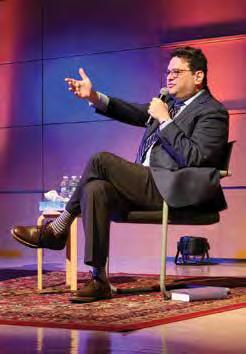
domain, “Jews need to, and are entitled to, reclaim the heart of our tradition: that Jews and Christians sometimes think about love in very different ways, and it’s worth drawing out some of those differences and understanding them deeply.”
Held’s Feb. 11 visit to Pittsburgh will include a public conversation with Rev. Jerome Creach, the seminary’s Robert C. Holland professor of Old Testament.
“I hope that Professor Creach and I can model what it means for two people with great respect for each other to talk across deep and fundamental theological differences,” Held said.
The theologians’ exercise is intended to encourage others with diverse religious views to do more than get together to share simple pleasantries.
“Interfaith dialogue is about learning to trust each other enough to talk about biblical things, including theological and ethical differences,” he said. “That’s one of the reasons why I hope that members of the Jewish community will attend this event because I very much value the idea of Jews and Christians talking together about topics that really matter, and that have divided us and that have caused great pain between us.”

Too often lost is the reality that “religious people have spent thousands of years murdering each other, and dehumanizing each other and bolstering their own identities by degrading other people,” Held added. “It’s long past time for religious people of all traditions to live with each other differently.”
In the year since his work was published, Held has joined numerous Christian theologians to talk about love. One of the most recurring questions involves expressing love in difficult circumstances, specifically, “How does one love an enemy?”
That question has a certain difficulty in that “we use ‘enemies’ to mean a lot of different things,” Held said. “An enemy can mean someone I don’t get along with at work; an enemy can mean someone I was in business with and we had a falling out and I have questions about their ethics; an enemy can mean [Yahya] Sinwar or Saddam Hussein. And it is not clear to me at all from the perspective of Jewish ethics that Judaism says I should have the same posture towards all three of those groups or people.”
What Held has realized since authoring the book is that “Jewish ethics is pretty clear that in the first two of those categories there is an obligation to love our enemy, certainly

to treat them lovingly. The third category is where I think there’s a bit of a divide between the Jewish tradition and the Christian one,” he said. “I don’t think there’s a mitzvah to love genocidal murderers. I don’t. There is a crucial value in not dehumanizing anyone because of the immense ethical dangers that come from that, but I think the conversation would benefit from a lot more nuance about who we’re talking about when we’re talking about enemies.”
A balance of pause, exploration and specificity is critical, Held stressed.
“In general, when there are these huge scale truisms — Christianity says X but Judaism says Y — those truisms should be interrogated so that we get a more complicated worldview,” he said. “Christianity believes in a trinity, Judaism doesn’t. That’s true. But Christianity teaches love your enemies and Judaism doesn’t? That’s actually quite messy.”
“Judaism is About Love: A Conversation with Rabbi Shai Held and Rev. Dr. Jerome Creach” will occur at Pittsburgh Theological Seminary, on Feb. 11 at 6:30 p.m. Registration is available at pts.edu/judaism_is_about_love. PJC
Adam Reinherz can be reached at areinherz@pittsburghjewishchronicle.org.





































Submit calendar items on the Chronicle’s website, pittsburghjewishchronicle.org. Submissions also will be included in print. Events will run in the print edition beginning one month prior to the date as space allows. The deadline for submissions is Friday, noon.
q FRIDAY, FEB. 7–SATURDAY, FEB. 8
The Rotunda Collaborative invites you to attend Savor: A Sephardic Music and Food Experience with chef Susan Barocas and musician/author Sarah Aroeste of Savor. Engage in a weekend of food, music, history, learning and community, including a communitywide Sephardicstyle service at Rodef Shalom. Friday night services are free; Saturday events are $18/each. rotundapgh.com.
q FRIDAY, FEB. 7 –FRIDAY, FEB. 28
Pittsburgh-area Jewish students are invited to apply for ZOA: Pittsburgh’s scholarship to Israel program, taking place in summer 2025. The scholarship is open to junior and senior high school students in the fall of 2025 who are traveling to Israel on a structured study trip. Applications are due by Feb. 2 and can be requested by emailing pittsburgh@zoa.org. A ZOA committee judges applications and three $1,000 scholarships will be awarded.
q SATURDAY, FEB. 8
Join Congregation Beth Shalom for Clues and Schmooze, a fun trivia event including a raffle, open bar and snacks. Trivia will be played in teams of three to six. Bring your own team or be matched at the door. Must be 21 years of age or older to participate. Doors open at 7 p.m. Trivia starts at 8 p.m. To register visit, bethshalompgh.org/2025-clues-and-schmooze.
q SUNDAYS, FEB. 9–JULY 27
Join Chabad of Squirrel Hill for its Men’s Tefillin Club Services and tefillin are followed by a delicious breakfast and engaging discussions on current events. 8:30 a.m. 1700 Beechwood Blvd. chabadpgh.com.
q MONDAYS, FEB. 10–JULY 28
Join Congregation Beth Shalom for a weekly Talmud study. 9:15 a.m. For more information, visit bethshalompgh.org.
Join Temple Sinai for an evening of mahjong every Monday (except holidays). Whether you are just starting out or have years of experience, you are sure to enjoy the camaraderie and good times as you make new friends or cherish moments with longtime pals. All are welcome. Winners will be awarded Giant Eagle gift cards. All players should have their own mahjong cards. Contact Susan Cohen at susan_k_cohen@yahoo.com if you have questions. $5. templesinaipgh.org.
q WEDNESDAY, FEB. 12
The first Squirrel Hill Lunch Brunch will meet at IHOP on Browns Hill Road. Noon. RSVP to Geri Linder (412) 421-5868 and mention you saw the notice in the Pittsburgh Jewish Chronicle.
q WEDNESDAYS, FEB. 12–MARCH 12
Join Chabad of South Hills for Decoding the Talmud Get inside the story, substance and significance of the book that defines Judaism. 7:30 p.m. 1700 Bower Hill Road. To register, visit chabadsh.com.
q WEDNESDAYS, FEB. 12–JULY 29
Temple Sinai’s Rabbi Daniel Fellman presents a weekly Parshat/Torah portion class on site and online. Call 412-421-9715 for more information and the Zoom link. Bring the parashah alive and make it personally relevant and meaningful with Rabbi Mark Goodman in this weekly Parashah Discussion: Life & Text. 12:15 p.m. For more information, visit bethshalompgh.org/life-text.
q THURSDAY, FEB. 13
Explore the Torah’s seven stages of growth while creating gorgeous focaccia garden bread at Chabad of the South Hill’s Tu B’Shvat Focaccia Garden. 7:30 p.m. $18 1700 Bower Hill Road. chabadsh.com.


q FRIDAY, FEB. 14
Join Chabad of the South Hills for Kids Do Shabbat, a family Shabbat experience where kids run the show. Candlelight followed by a four-course, kid-friendly dinner. Come dressed in your Shabbat finest. RSVP by Feb. 5 and choose your role. 5 p.m. 1701 McFarland Road. chabadsh.com/Shabbat.
q SUNDAY, FEB. 16
Join Temple Sinai for “Building a Resilient Community for Children & Adolescents: A Discussion.” Enjoy brunch followed by a discussion on mental health as part of Jewish Disability Awareness, Acceptance, & Inclusion Month. Speakers are Dr. Elizabeth Miller, who specializes in care for adolescents and young adults, and Carly Coons, a licensed social worker with the Blue Dove Foundation. 10 a.m. $10 in advance/$18 at the door. Free to watch on Zoom. Registrations required by Wednesday, Feb. 12. templesinaipgh.org/ programs-events.
Tree of Life Congregation, in collaboration with Parkway Jewish Center, welcomes the public to join them for a special Chocolate Tu B’Shevat Seder. Please note, tree nuts will be served. $5. 11 a.m. 201 Penn Center Boulevard, Building 1, Suite 530, 15235. Register at 412521-6788. treeoflifepgh.org.
We Never Heard from Them Again: Researching Relatives Who Died in the Holocaust puts the systematic murder of Jews and other persecuted populations during World War II into historical context before showing attendees how to research the fate of long-lost relatives. Webinar. 1 p.m. $5. pghjgs. org/event-details/we-never-heard-from-them-againresearching-relatives-who-died-in-the-holocaust-withjane-neff-rollins.
Refugee Mariam Al Ahmad will cook and host a Syrian luncheon at Rodef Shalom Congregation. Al Ahmad, her husband, Ahmed, and their five sons are excited for the opportunity to share their delicious Syrian cuisine with
the Pittsburgh community. $30 adults; $20 children, 5-17. 1:30 p.m. 4905 Fifth Ave. thrivepittsburgh.org/events.
q FRIDAY, FEB. 21
Join Rodef Shalom’s Cantor Toby Glaser for a 20s & 30s Kabbalat Shabbat. Get to know other young Jewish professionals and close out the week with apps, wine and great company. Registration required. 7 p.m. 4905 Fifth Ave. rodefshalom.org.
q FRIDAY, FEB. 28
Join Rodef Shalom Congregation and Thousand Bridges Opera Company following Shabbat services for the Look to the Light concert, a free recital inspired by the poetry of Langston Hughes to celebrate Black History Month, featuring soprano Alicia Jayourba with Jaime Cohen at the piano. 7 p.m. Free. rodefshalom.org/light.
q SATURDAY, MARCH 1
Big Night is the JCC’s largest annual fundraiser, celebrating community and supporting vital programs. This year’s Big Night Olympics promises games, music, global cuisine, and more — all for a great cause. A party with a purpose. 7:30 p.m. JCC of Greater Pittsburgh, 5738 Forbes Ave. bit.ly/bignight25.
q SUNDAY, MARCH 2
Join B’nai Emunoh for its first Jewish community vendors and crafters fair. Handmade jewelry and pens, handcrafted leather items, crocheted alef beis letters, Hello Kitty items, Dead Sea products, beauty, health and wellness products and more. 11 a.m. B’nai Emunoh, 4325 Murray Ave.
q SATURDAY, MARCH 8
Families with young children are invited to spend Shabbat morning with Rodef Shalom at Shabbat with You. Drop in for a light breakfast, play date, sing along with Cantor Toby and a Shabbat activity with Family Center Director Ellie Feibus. 9 a.m. $5 per family. Rodef Shalom Congregation, 4905 Fifth Ave. rodefshalom.org/ shabbatwithyou. PJC
The Pittsburgh Jewish Chronicle invites you to join the Chronicle Book Club for its March 2 discussion of “10/7: 100 Human Stories,” by Lee Yaron, an Israeli journalist. Yaron’s account of the Oct. 7 attacks in Israel and their aftermath was named the book of the year at the 74th National Jewish Book Awards, making her the youngest author to win the honor. The Jewish Book Council, which sponsors the awards, said that “10/7: 100 Human Stories,” provides “a vital window into the history of the Israeli-Palestinian conflict and how internal political turmoil in Israel has affected it, offering the narratives not of politicians or the military but of the lives of everyday people who lived tenuously on the border with Gaza.”
Your hosts
Toby Tabachnick, Chronicle editor
David Rullo, Chronicle senior staff writer


How it works
We will meet on Zoom on Sunday, March 2, at 1 p.m.
What to do
Buy: “10/7: 100 Human Stories.” It is available at area Barnes and Noble stores and from online retailers, including Amazon. It is also available through the Carnegie Library system.
Email: Contact us at drullo@pittsburgh jewishchronicle.org, and write “Chronicle Book Club” in the subject line. We will send you a Zoom link for the discussion meeting.
Happy reading! PJC
— Toby Tabachnick

By Abigail Hakas | Special to the Chronicle
It’s far from the typical concert scene: attendees waving scarves, wandering around, playing with fidget toys and even jumping.
But it’s typical at the sensory-friendly Azure Family Concerts, a program of Autism-Pittsburgh, where “all behaviors are welcome.” For Jewish Disability Awareness & Inclusion Month, the “Unlimited Sound” concert on Feb. 2 at Temple Ohav Shalom highlighted the work of disabled artists.
Throughout the concert, attendees were handed egg shakers and scarves to twirl, and encouraged to sing along or escape the noise in a quiet tent filled with toys through a door in the back of the room.
It attracted a wide range of people: Older folks came to hear the free music and parents brought excited young kids.
Before the concert began, a child brought in too many stuffed animals to count, plopping them on the ground.
While at other concerts that might get a scolding, it was welcome here. Here, atypical concert behaviors get a smile from other attendees, who split their focus between the musicians and playful children.
Anitra Birnbaum, executive director of Azure, started the concert series after her family moved from Baltimore to Pittsburgh in 2020. Back in Baltimore, her oldest son, Aaron, who is on the autism spectrum, enjoyed the ability to freely express himself at Azure concerts.
“It was the only family outing that we knew would be successful,” Birnbaum said. “It was really wonderful to find a non-judgmental, friendly environment where my son could just be himself.”
But after moving, the Birnbaum family realized there was no option like it in Pittsburgh, so Birnbaum took it upon herself to start an Azure concert series here. A Jewish woman and member of Temple Ohav Shalom, she sees it as a “tikkun olam project.”
Aaron, 16, started playing saxophone after attending Azure concerts when he was younger. At the Feb. 2 concert, he played “What the World Needs Now is Love.”
Other pieces, such as Beethoven’s “Ode to Joy” and Stevie Wonder’s “Signed, Sealed, Delivered (I’m Yours),” were performed after a brief history lesson from Leah Huber, Azure’s artistic director. She explained how each piece was composed by a disabled artist; Beethoven was deaf and Stevie Wonder is blind.
The concert featured songs that had connections to other disabled artists. Huber sang “Defying Gravity” from “Wicked” after explaining how Marissa Bode was the first wheelchair user to depict the disabled Nessarose in the 2024 movie adaptation.
As Huber projected slides about each of the disabled artists onto the wall, a child wearing headphones walked in front of the projector. The shadow cast elicited a few quiet smiles from audience members.

The almost monthly concert series typically draws in around 100 people with a wide range in age and ability. The next performance, “Enchanted Melodies,” is a musical opera about a fairytale princess on March 9 in Sewickley, and registration can be found at autismpittsburgh.org.
Azure holds concerts in parks, libraries and synagogues like Temple Ohav Shalom, which recently formed an accessibility committee.
Birnbaum is the committee’s chair. While Temple Ohav Shalom already had accommodations, Birnbaum realized the website lacked information about accessibility.
Forming the committee was a way to ensure that those who need accommodations know they are welcome.
“How do people know you love and appreciate them if you don’t tell them?” Birnbaum asked.
During the concert, Sage Herman Dietzel’s daughter Daisy played with egg shakers and a scarf. It was their first time attending an Azure concert.
“She’s only 4, so being able to move around and feel comfortable to do that and not have people frustrated that little ones are making noise or moving around is great,” Herman Dietzel said.
Herman Dietzel typically takes her daughter to outdoor concerts where there isn’t the same expectation of quiet stillness. While her daughter isn’t on the autism spectrum, Herman Dietzel emphasized the value of attending the concert.
“I think it’s important to bring my kids to all different types of events and just be around all different types of people,” she
said. “I just love how this is welcoming of everybody and all different abilities and different needs.”
Daisy moved around as the musicians performed: Huber on vocals, Tino Cardenes on piano, Johannah Dickenson on oboe, Andrew Zimlinghaus on saxophone and Emmanuel Houndo on violin.
The musicians performed classical, jazz and Broadway music. While the genres vary from concert to concert, the theme for February’s concert was simple: joy.
And that joy was evident as one child ditched his fidget spinner, tossing it onto the floor in front of him, to wave a purple scarf in colorful arcs above his head. After the concert, attendees were invited to touch



instruments during an instrument petting zoo, and the children quickly began to make their own music.
For Birnbaum, the positive reception to the concert series is indicative of the power of music.
“It’s just a great alternative to using language to be able to connect with people and express yourself,” Birnbaum said. “I think it’s a great way to help people who have difficulty interacting with others to have some kind of a common ground where language doesn’t have to get in the way of that.”
PJC
Abigail Hakas is a freelance writer living in Pittsburgh.

Free & open to anyone struggling with infertility Monthly virtual support groups facilitated by licensed infertility therapists Fertility Buddies matches veterans with those going through infertility for peer-to-peer support
Shifting the understanding of infertility and how the Jewish community views and supports those with fertility challenges Panels, discussions, lectures, and one-on-one trainings for clergy, fertility clinic medical staff, and families affected by infertility Grants up to $10,000 for fertility treatments Up to $10,000 of Interest Free Loans
By Arno Rosenfeld | Forward
Leo Terrell, the civil rights attorney picked Monday to lead a new Department of Justice task force to combat antisemitism, blamed President Donald Trump for rising antisemitism as recently as 2020.
“There has been a rise in antisemitic violence this year during the Trump administration, there’s a rise in antisemitic violence in New York, Trump’s home state,” Terrell said during an appearance on Fox News in early 2020.
But months later, Terrell had undergone a political conversion.
“My Jewish American friends,” he posted on Twitter shortly before the 2020 presidential election, “there is no way you can support Joe Biden who has failed to denounce the anti-somatic [sic] remarks of Louis Farrakhan and Al Sharpton.”
Who is Leo Terrell?
Terrell, who is Black, first rose to prominence in 1990s Los Angeles as one of O.J. Simpson’s loudest public supporters and subsequently leveraged a local talk radio show into regular appearances as a liberal guest on conservative cable television shows before he underwent a political conversion into what he calls “Leo 2.0” and became an outspoken supporter of President Donald Trump on Fox News.
“He’s sort of a new name to a lot of people,” said Dov Hikind, the former New York state lawmaker and founder of Americans Against Antisemitism. “But not to me.” (Hikind is rumored to be under consideration for Trump’s special envoy to combat antisemitism.)
The two became friends after connecting on X, formerly Twitter, where Terrell has posted hundreds of times in support of Israel and about antisemitism since Hamas attacked Israel on Oct. 7 sparking a war in Gaza.
“Jews are treated as second class citizens in America!” Terrell said in a representative post in December 2023. “SHAMEFUL.”
Terrell has also become a staunch opponent of Al Sharpton, the preacher and Black civil rights leader despised by some in the Jewish community for his role in the 1991 Crown Heights riots. “Al Sharpton shut up,” he said in one video while wearing a red Leo 2.0 hat, which he sells online for $30. “You are no friend to the Jewish community.”
Terrell said in a text message that he was not available for an interview Monday.
About face for civil rights attorney
Leo 1.0 had defended Sharpton during regular appearances on Fox News.
“I have no problem with Al Sharpton,” Terrell said during a 2015 appearance after host Sean Hannity asked whether he was comfortable with Sharpton visiting the White House. “This obviously feels like a race card issue.”
And while Media Matters, a liberal

p U.S. Department of Justice
watchdog group, has stated that “Terrell made a career at Fox News arguing that systemic racism doesn’t exist,” he initially gained fame as an NAACP attorney in Los Angeles.
“Blacks have historically been treated unfairly in the criminal justice system,” Terrell told the Boston Herald in 1995, when he was profiled as one of a growing number of Black legal commentators appearing on national television.
The year prior Terrell had warned that a ballot initiative was likely unconstitutional as it sought to “save” California from a growing number of immigrants by requiring schools to report undocumented students to the police.
Terrell’s first break with the liberal establishment appears to have come in 2003, when he endorsed Carolyn Kuhl, who then-President George W. Bush had nominated to the Ninth Circuit Court of Appeals. Democrats successfully filibustered Kuhl’s nomination and Terrell’s support for her ruffled feathers with the NAACP, who downplayed Terrell’s longstanding connections to the organization.
“They were trying to make me goose-step with them,” Terrell said at the time. “I felt embarrassed to call myself a member of the NAACP. I was proud to quit.”
But Terrell continued to serve as a liberal foil for conservative cable news hosts, including Sean Hannity, Tucker Carlson and Bill O’Reilly until, he says, he heard President Joe Biden say in a May 2020 radio interview: “If you have a problem figuring out whether you’re for me or Trump, then you ain’t Black.”
“What has happened to the Democratic party?” Terrell asked in an op-ed for Fox News in August 2020. “I don’t even recognize it anymore — not since they allowed all policy decisions to be made by extremists within the Black Lives Matter and Antifa movements.”
(“Black Lives Matter is a legitimate
political group,” Terrell had said on the channel in 2015.)
Five months after he announced his switch to supporting Trump, Fox signed him to a paid contributor role. The announcement stated that Terrell had previously h eld leadership positions at the Equal Employment Opportunity Commission and with California’s Statewide Commission Against Hate Crimes.
And by 2023, Terrell was echoing Trump’s comments about how Jews should vote. “No Jewish American in his or her right mind should vote Democrat,” he wrote in November 2023.
While he was still a Democrat, Terrell was invited on Fox News for a short debate with Candace Owens over “the left’s antisemitism problem.” Terrell blamed Trump for rising antisemitism while Owens, who was at the time a mainstream conservative pundit but has since embraced antisemitic conspiracy theories, defended the president and blamed Democrats.
The following day he posted on Twitter: “There has been an increase nationally in anti-Semitic violence during the Trump administration. Why Candace?”
Since Oct. 7, 2023, Terrell has become fixated on antisemitism related to the protests against Israel. “He’s just a great guy and a real mensch and cares deeply, deeply, deeply,” said Hikind. “I never asked him like, ‘Where does this come from?’ — that of all the people in the world, he’s going to be playing this role in the Justice Department — but he’s just a good guy.”
Hikind said he was not sure exactly how Terrell was selected to lead the inter-agency task force on antisemitism, but said that Terrell was close with Trump and that the two golf together.
The Justice Department said that the task force was created in response to Trump’s executive order on antisemitism last week, in which he called on the attorney general to identify new laws that could be used to fight antisemitism related to Israel, and to consider intervening in private lawsuits alleging antisemitism.
Terrell has regularly shared posts from organizations like StopAntisemitism that publicize the names and faces of individuals they believe espoused antisemitism, usually related to criticism of Israel. “America knows your first and last names,” he wrote in one post aimed at a group of law students. “We will make sure you remain unemployed forever!”
He also invoked his experience as a civil rights lawyer to call on the Biden administration to do more to protect Jews.
“You have an affirmative obligation under the law to protect the Jewish community 24/7,” Terrell said on X in December 2023. “You are required under the law to take all necessary steps for the Jewish community to celebrate Hanukkah.”
Since Trump named Terrell senior counsel to the assistant attorney general for civil rights in the Justice Department in January, he has been vocal about his plans to target universities he believes have allowed antisemitism to fester.
Above a video of pro-Palestinian demonstrators outside the gates of Columbia University two weeks ago, Terrell wrote: “Attention Board of Trustees of all colleges and universities allowing antisemitic behavior to take place. You have a fiduciary duty to protect Jewish students! Expect a letter from me in the immediate future! Leo Terrell Senior Counsel, Department of Justice.” PJC
This story was originally published on the Forward.
Far-right Polish lawmaker disrupts moment of silence for the Holocaust to decry ‘Jewish genocide in Gaza’
A far-right Polish member of the European Parliament with a history of antisemitic statements disrupted a moment of silence for the victims of the Holocaust in order to decry “the Jewish genocide in Gaza,” JTA reported.
Grzegorz Braun, chairman of the far-right Confederation of the Polish Crown party, known as KKP, interrupted the minute of silence on Wednesday, two days after International Holocaust Remembrance Day. In footage of the moment, voices were audible as Roberta Metsola, the European Parliament’s president, called for silence. Then, Braun began to speak in a loud voice.
“Let’s pray for the victims of the Jewish genocide in Gaza,” he said. After a pause, he added, “Thank you, everybody, for praying for the victims of the Jewish genocide in Gaza.”
After the minute of silence, Metsola said, to applause, “Mr. Braun, you leave the chamber now.”
Braun’s party website, which features his photo on the homepage, also includes a link to an 18th century encyclical by Pope Benedict XIV recommending that Poles deprive Jews of property, restrict them from holding office and avoid doing business with them.
This is not his first antisemitic action as a public official. In December 2023, he used a fire extinguisher to put out a Hanukkah menorah in Polish parliament. He was temporarily expelled from parliament and penalized as a result. Earlier in the year, he
shut down a lecture by Polish-Canadian historian Jan Grabowski by storming the podium and damaging it.
On Jan. 29, the European Jewish Congress called Braun’s interruption “A vile display of antisemitism in the heart of European democracy.”
Police in Australia seize explosives they say may have been intended to kill Jews
Police in Australia say they have seized explosives that they believe were intended for a plot to target Jews, according to JTA.
The explosives, as well as material containing details about Jewish institutions, were found in January in a camper van in a suburb of Sydney. Police disclosed the find on Jan. 30 amid rumors of arrests and a steady drumbeat of disquieting antisemitic incidents in the country.
“This would strike terror into the community, particularly the Jewish community, and it must be met with the full resources of the government,” the premier of New South Wales, Chris Minns, said about the find. “And I want to assure the people of NSW that’s exactly what’s happening.”
Arrests related to the operation were initially made by members of Strike Force Pearl, a police task force launched in December to combat antisemitic violence in Sydney. In recent weeks, local Jews have contended with almost nightly incidents, including graffiti, arson and harassment. A fire accompanied by anti-Israel graffiti at a child care center in a Jewish neighborhood in January stirred particular unease, as did a fire set outside the former home of Alex Ryvchin, the co-CEO of the Executive Council of Australian Jewry.
The harm caused by the seized explosives,
Feb. 10, 2009 — Netanyahu wins by finishing second
were they to detonate, could have dwarfed those incidents, police and local Jewish leaders said.
“This is undoubtedly the most severe threat to the Jewish community in Australia to date,” the Zionist Federation of Australia said in a statement. “The plot, if executed, would likely have resulted in the worst terrorist attack on Australian soil.”
The group is calling for more information about the incident as well as the arrests to be made public.
Israeli Foreign Minister Gideon Saar said the suspected planned attack offered evidence that Australia was doing too little to protect its Jews, who number about 100,000 and live primarily in Sydney and Melbourne. “We expect the Australian government to do more to stop this disease!” Saar tweeted on Jan. 29, extending criticism that Israeli Prime Minister Benjamin Netanyahu has previously leveled.
The number of antisemitic incidents reported in Australia last year was four times the number from the previous year, reflecting a spike following the outbreak of the Israel-Hamas war in Gaza. Australian authorities emphasize that they have aggressively sought to investigate and prosecute people suspected of antisemitic violence. Since the launch of Strike Force Pearl, at least nine people have been arrested.
An assistant director for a Canadian pro-Israel media watchdog group is facing 17 criminal charges in connection with a string of profane anti-Palestinian graffiti that included the phrase “F— Gaza,” JTA reported.
Robert Walker, 39, remains employed by Honest Reporting Canada months after his
November arrest. The organization, which is headquartered in Toronto, has not made any statement on his arrest, the graffiti or his continued employment, and did not respond to a request for comment.
An attorney for Walker, Leora Shemesh, also did not immediately return a request for comment from the Jewish Telegraphic Agency. She told the Toronto Star over the weekend that her client would be pleading not guilty. Shemesh added that the charges against Walker had been “politicized” owing to an “emotionally charged climate associated to the Middle East conflict,” adding that he had faced harassment at his home.
“This case should not be used by anyone as an excuse to target, harass and or intimidate an individual who at this time has done nothing wrong,” Shemesh added.
Shemesh herself has drawn attention for her pro-Israel advocacy. Last year, she was ejected from a Toronto Raptors NBA game for wearing a “Free Our Hostages” sweatshirt to the arena. (She argued that her sweatshirt should not be seen as a violation of the NBA’s ban on political messaging because supporting hostages should be apolitical.)
Toronto police arrested Walker alongside two others, one of whom is 71 years old, in conjunction with November’s graffiti incident. The graffiti were painted on sidewalks, planters and construction signs — considered city property — along a stretch of busy Queen Street East.
All three are charged with 17 counts of “mischief,” and are due back in court in late February. A fourth suspect is being sought by police but hasn’t yet been identified. PJC
— Compiled by Jarrad Saffren


Items are provided by the Center for Israel Education (israeled.org), where you can find more details.
Feb. 7, 1974 — Gush Emunim is established
Followers of Rabbi Tzvi Yehuda Kook respond to the Yom Kippur War by launching Gush Emunim (Bloc of the Faithful), a settler movement determined to establish a permanent Jewish presence in the lands captured in June 1967.
Feb. 8, 2005 — Second Intifada is declared over
Israel’s Ariel Sharon, the Palestinian Authority’s Mahmoud Abbas, Egypt’s Hosni Mubarak and Jordan’s King Abdullah II close a summit in Sharm el-Sheikh, Egypt, by declaring the end of the Second Intifada.
Feb. 9, 1953 — Soviet Embassy is bombed

The Soviet Union’s embassy in Tel Aviv is bombed, injuring three people, in an attack blamed on the Kingdom of Israel terrorist group. Despite Israeli apologies, the Soviets break off diplomatic relations.
Tzipi Livni’s Kadima wins 28 seats in the election for the 18th Knesset, but Benjamin Netanyahu’s Likud, with 27 seats, is the effective winner because it is better positioned to form a governing coalition.
Feb. 11, 1986 — Sharansky reaches Israel

After eight years in a Siberian labor camp, Anatoly Shcharansky is released to American custody in Berlin and flies to Israel, where he arrives under his new Hebrew name, Natan Sharansky.
Feb. 12, 1994 — Israel’s first winter Olympian
The Winter Olympics open in Lillehammer, Norway, with an Israeli team for the first time. It consists of figure skater Michael “Misha” Shmerkin, who finishes 16th. He was part of the wave of ex-Soviet immigration.
Feb. 13, 1955 — Israel announces purchase of Dead Sea Scrolls
Prime Minister Moshe Sharett announces at a news conference that Israel has acquired four of the first seven Dead Sea Scrolls found in Qumran through a $250,000 purchase facilitated by two Hebrew University faculty members. PJC
Continued from page 1
opportunities in 2024 — 93 trainings were held last year, with more than 7,500 people participating. A new page on Federation’s website, jewishpgh.org/info/training, is dedicated to providing information about the training opportunities.
Gone are the days of Federation training only for an active shooter situation, Brokos said.
“We’re doing a lot of medical intervention training, but it doesn’t have to be as high level as CPR certification,” she said. “It can be what we’re calling ‘first to respond.’ That’s really what we see a need for because in our locations that’s what we’ve seen the most — someone having heart issues or issues related to diabetes — where people need to know what to do until medics respond.”
Last year also saw local groups receive more than $2 million in state and federal grants, and Federation is committed to continue assisting organizations, both Jewish and non-Jewish, in applying for grants in 2025.
Twenty-five Jewish organizations now have access to the BluePoint emergency response system, with another eight
Council:
Continued from page 1
“It’s quite alarming what we’re seeing at the moment in Washington,” Warwick said. “I have concerns about really doing anything at all that sort of hamstrings the power of the people of Pittsburgh to exercise their ability to participate in the democratic process as is laid out in our Home Rule Charter.”
Warwick outlined the same concerns during a Feb. 3 public hearing about the bills.
During the Feb. 3 hearing more than 20 people spoke about the proposed ordinances; three-quarters of those addressing council spoke in favor of its proposed legislation.
Many of those who spoke at the hearing addressed Warwick directly, saying that they lived in her district and believed the council’s referendums should be added to the ballot.
Share Torah Rabbi Yitzi Genack said the proposed legislation would safeguard the city from being “distracted by special interest groups pushing politically extreme agendas that do nothing to serve the city of Pittsburgh.”
Tree of Life Rabbi Jeffrey Myers recalled the federal jury trial of the Pittsburgh synagogue shooter, saying he thought that would have ended antisemitism in Pittsburgh. He questions that now, he said, given Not On Our Dime’s proposed referendum.
“Are we going to continue to be a place that harbors all forms of discrimination, including antisemitism? That’s a fear that not only I have but the vast Jewish community of 50,000 persons in the Greater Pittsburgh area still continue to have when you single out one nation on this planet,” he said.
Julie Paris, StandWithUs’ Mid-Atlantic regional director and a Squirrel Hill resident, said the two council referendums would “ensure that our focus remains on issues that directly impact our city, support our residents, keep our communities safe and address the local challenges that matter
scheduled to join the network soon.
Brokos doesn’t expect the number of antisemitic incidents to ebb during 2025, but she and her team are committed to ensuring the Jewish community is safe at events like the Maccabi Games, scheduled to take place here this summer.
Director Eric Kroll — through their partnership with the national Secure Community Network have started offering event monitoring to organizations.
“What that means is that if you are hosting an event, large or small, let us know and SCN will set up monitoring, meaning they
“I see some unknown challenges ahead but also see us as a community rising up and tackling those challenges.”
–SHAWN BROKOS
New security initiatives include partnering with the city to install license plate reader cameras; creating crisis response group tactical maps for law enforcement — robust maps that will be available to law enforcement officers that show exits, stairwells, rooms, lockdown spaces, etc.; and adding police boxes, which will assist law enforcement entering buildings when no one is there to greet them.
Brokos and her team — Security Program Coordinator Erin Fagan and Deputy Security
will look for any derogatory intelligence or chatter that comes in about the event. The goal is they will pick it up and let us know,” she said.
Federation is also developing a campus incident report form to be used at local colleges and universities. The initiative, Brokos said, began after several students said they didn’t feel like issues they reported to their schools were being addressed.
Federation will be part of the antisemitism working group at the University of

most to constituents.”
Not On Our Dime’s legislation, Paris contended, would cost the city millions of dollars “by limiting our access to the global marketplace at a time when our city is already struggling financially.”
Not On Our Dime is attempting to gather more than 12,500 signatures so that its referendum will be added to the May ballot. It seeks to amend the Home Rule Charter to establish “a financial policy to divert funds from governments engaged in genocide and apartheid — such as the state of Israel and corporations doing business with them,” implement “investment policies with goals to reduce arms production and promote human dignity” and “increase “transparency of City business relationships and investments.”
(Where should the quote begin here?)
One of the organization’s leaders, Ben Case, spoke out against the council’s proposed
Pittsburgh, she said, which will help create the form.
“We have a really good draft,” she said. “We’re relying on the working group to help guide us.”
The goal, Brokos said, is for students to have a safe place to report issues.
While she doesn’t have a crystal ball, Brokos said Pittsburgh will continue to be in a heightened threat environment for 2025. White supremacy, she said, is being conflated with international and domestic terrorism, requiring security and law enforcement to broaden the lens through which they view potential threats.
Pittsburgh has an “incredible” group of community leaders, Brokos said, who partner with Federation to keep the community safe.
“We have the infrastructure in place,” she said. “What I have seen in my five years of doing this job is that we do this together through teamwork as a community. We’re exceptionally strong and that’s something I take great solace in. I see some unknown challenges ahead but also see us as a community rising up and tackling those challenges.” PJC
David Rullo can be reached at drullo@ pittsburghjewishchronicle.org.
F ollowing public comments, Councilmember Erika Strassberger, who introduced the legislation — co-sponsored by Bob Charland, District 3, Anthony Coghill, District 4, Daniel Lovelle, District 6 and Bobby Wilson, District 1 — addressed some of her constituents’ concerns.
She noted that the Not On Our Dime legislation targets Israel and makes no mention of countries like China.
If Not On Our Dime’s legislation passes, Strassburger said the city would be unable to do business with companies including Amazon, Apple, Caterpillar, City Bank, Coca-Cola, Dell, General Electric Google Alphabet, HP, IBM, Intel, JP Morgan Chase, McAffee, McDonald’s, Micron, Microsoft, Nestle, Oracle, Pepsi, Qualcomm, Siemens and Toyota, among others.
“We can’t subject our residents to the threat of service disruptions because we can’t contract with a mainstream corporation that happens to operate in a country that some don’t like,” she said.
legislation, which he acknowledged targeted Not On Our Dime’s referendum. Recognizing that one of council’s concerns was the city’s ability to function if forced to divest from companies that do business with Israel, he said their language “makes it clear that the divestment practices would be where possible.”
Case said, if approved, the Not On Our Dime referendum would provide added transparency about what companies the city does business with and with whom it was unable to divest and why.
He went on to address the divisiveness that he said was apparent during a meeting a week ago that voted both referendums out of committee, allowing a full vote by the council.
“We’re not creating divisiveness,” Case said. “There is divisiveness out there. We’re trying to find a productive and democratic outlet for a lot of frustrations that are out there. We’re not creating that.”
Now approved, the two ordinances head to Mayor Ed Gainey’s desk for his signature before being added to the ballot. It is unclear if Gainey intends to sign the legislation or if the bills can be added to the ballot should he choose not to sign them.
Gainey told the Chronicle last month that he wasn’t sure amendments to the Home Rule Charter “are an appropriate or effective way for us to engage in dialogue.”
The mayor said he has asked the city’s law department to review the council’s ordinances, as well as the proposed referendum Not On Our Dime hopes to have added to the ballot.
Even if Not On Our Dime gathers enough signatures, it will still likely face legal challenges before being added to the May ballot. PJC
David Rullo can be reached at drullo@ pittsburghjewishchronicle.org.
members of the Greater Pittsburgh Jewish Clergy Association.
Rabbi Mark Asher Goodman directs the course and said he’s seen increased enrollment during the past three years, with this year’s group of almost 60 being the largest yet.
Goodman hasn’t heard everyone’s rationale for registering, but said students rarely have just one reason for signing up — the exception being post-Oct. 27, 2018, when an antisemite stormed the Tree of Life building and murdered 11 people from three congregations in the midst of Shabbat prayer.
“We had a significant number of people, even in 2019 and 2020, saying that Oct. 27 and the shooting was something that prompted them to want to learn more about Judaism.”
Goodman doesn’t think Oct. 7 spurred the same desire.
“I think there was a tremendous outpouring of sympathy and understanding on Oct. 27, after the shooting in 2018, and this deep sense of these people who were in prayer, and they’re practicing their values, and committed to their community, and they endured a terrible tragedy,” Goodman said. “And I think Oct. 7 was also a terrible tragedy, and horrendous and heartbreaking, but the war that followed it then created a lot more mixed feelings and complexity between the non-Jewish and the Jewish communities.”
Another possible reason that fewer people cite Oct. 7 as the impetus for learning, Goodman believes, is “there’s the fact that Israel is all the way over there, and Squirrel Hill and Pittsburgh is right here,” he said. “That makes it feel a lot harder to kind of wrap your brain around.”
Along with directing the course, Goodman is mentoring seven people for conversion. The process involves regular check-ins. Days ago, one of his students wanted to talk about Zionism.
“She wasn’t really familiar with the concept, or why Zionism was slightly more controversial for some,” he said.
The conversation, Goodman continued, was a “really interesting eye-opener” about the recent crop of Intro to Judaism registrants, most of whom are under 35 years old.
“They don’t really have that long-term historical vision of the state of Israel being a lifeboat for the Jewish people after the horrors of the Holocaust,” Goodman said. “They don’t understand Israel’s place in the world. They don’t really know the heroic stories of Israel’s founding from ‘48, and their story of resistance, and overcoming in ‘67 and ’73. People who are 35 and younger have grown up with the Intifada One, the Intifada Two and kind of a failed
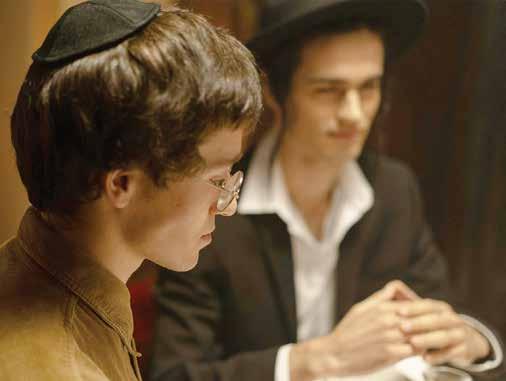
“The history of the Jewish people is just an incredible history of suffering in one sense, but also perseverance. Going back to biblical times, all the way back to the Exodus, there is suffering, and being delivered and persevering.”
–JUSTIN RUBENSTEIN
two-state situation.”
For the majority of younger learners, Israel is “mostly controversial now, as opposed to Israel being mostly kind of heroic and inspiring,” he added.
During its 25-week span, Pittsburgh’s Intro to Judaism course addresses Zionism.
“We’re very focused on the history, and ‘just the facts ma’am,’ and kind of understanding the necessity of Israel,” Goodman said. “The history of the politics, the history of the conflict, is not the focus of the class. We try and make space for it, but we say at the end, ‘Your mileage may vary, it’s important for you to stay engaged in this, and if you feel one way or another politically on this issue, that’s great — that is reflected in the larger Jewish community, where people have a belief in one state or a one-state solution, a belief in a twostate solution, or a belief in this, that or the other outcome for the Palestinians. Those are beliefs that we want you to explore, but we don’t necessarily want to impart some view upon you.’”
When Israel was in Egypt’s land
Even before beginning the conversion process, Rubenstein was interested in
Middle Eastern politics and tales about ancient Israel.
“The history of the Jewish people is just an incredible history of suffering in one sense, but also perseverance,” he said. “Going back to biblical times, all the way back to the Exodus, there is suffering, and being delivered and persevering.”
For Rubenstein, that narrative gained new significance.
“With what I was going through personally — kind of feeling the same type of thing, of things falling apart but yet persevering to something different and better — that kind of dovetailed in Oct. 7,” he said. “That was really kind of a flash point for me to say, ‘Yeah, I need to figure this out and really get into it, because these things continue to go on.’ It didn’t end with the Holocaust. It didn’t end with the establishment of Israel. There are issues, and not just in the Middle East, but everywhere — I mean, the synagogue attack in Pittsburgh was another factor — there are people out there that just don’t like Jewish people for whatever reason, irrational or whatever, but it’s historical. And so I felt a need to embrace that and really understand it.”
As Rubenstein immersed himself in Judaism, his appreciation grew.
“I came to understand that I want to be a part of that story,” he said. “I want to stand in that tradition, with the Jewish people, in the Jewish community.”
There’s the benefit of collective experience, but there’s also a personal draw to conversion, he continued. “For me, it’s also a spiritual and mindfulness practice of how to be a better person and how to live a better life.”
Several rabbis who spoke with the Chronicle recalled various conversion tales and reasons why people decided to adopt a new faith.
Events may prompt someone’s desire, but when people are drawn to Judaism because they “fundamentally feel that they should be Jewish, that they belong with the Jewish people, that they want to be a part of us, that’s always a rewarding experience,” Adelson said.
Shortly before entering the mikvah last week, Rubenstein met with a beit din. The three-member panel of Jewish judges asked him why he wanted to complete the process.
“I said it felt to me like walking into the ocean,” he recalled. “You start, you dip your toes in, you walk a little bit more, you get up to your ankles and your knees, and then you start swimming and you realize just there’s so much more to go that’s so deep and so wide. That’s how I feel.”
Nearly 2,000 years ago, another convert articulated similar tropes. According to legend, Ben Bag-Bag was a Roman soldier who asked the great Jewish sages Shammai and Hillel to teach him the whole Torah while standing on one foot. Although Shammai dismissed the inquiry, Hillel said, “That which is hateful to you, do not do to another. That is the entire Torah. The rest is interpretation. Go study.”
Tradition teaches that Ben Bag-Bag converted, grew in scholarship and later said of the Torah: “Turn it over, and turn it over, for all is in it. Look into it, and become gray and old in it. Do not move away from it, for you have no better portion than it.”
Rubenstein came to Judaism because of questions. Immersion in the mikvah didn’t provide all the answers.
That’s the point, he said. “The very name Israel means to wrestle with God. I think that after Oct. 7, and wondering what that all meant, and then what I was going through personally, with my marriage falling apart, I guess I always knew that to some extent, but it really struck me at that moment to think, ‘Yeah, that’s exactly what I’m doing. I’m wrestling with God and what does all this mean, what’s the purpose? How do we live, right? That’s really the question. How do you live?’” PJC
Adam Reinherz can be reached at areinherz@pittsburghjewishchronicle.org.
Guest Columnist
Jeremy Kazzaz

Pittsburgh’s government exists to serve its residents — not to be a playground for ideological activists. Yet once again, a special interest group is trying to drag our city into a divisive political battle, using our resources and institutions as props in their campaign.
At the center of this latest fight is the group Not On Our Dime, which is pushing a ballot referendum under the guise of holding the city accountable for its spending. But beneath the marketing, this initiative is a reckless and discriminatory attempt to force Pittsburgh to sever ties with businesses they personally disapprove of, even if it means breaking the law, harming public health and crippling essential services.
One of the most shocking consequences of their proposal? It would limit Pittsburgh’s access to life-saving medication like Narcan, a crucial tool in fighting the opioid crisis. The reason? Because Not On Our Dime doesn’t like the fact that some pharmaceutical companies that produce Narcan also do business in Israel. Their message is clear: Their political agenda matters more than the lives of our neighbors battling addiction.
This is the third time inside of a year that activists have tried to force their ideological purity test onto city policy. But now, City Council has a chance to put an end to these political stunts and get back to the important work of governing our city.
Guest Columnist

The angel of death has taken permanent residence in Israel. Wandering from village to town under a sky so stunning it takes our breath away. He must be stomping over the baby grasses, dandelion leaves and mallow, crushing sparkling drops of early morning dew.
Last Shabbat I woke up crying from a dream, opened my eyes and the tears did not stop. It was a beautiful winter day and I took a walk to an oak tree filled with tweeting birds. I sat breathing deeply, something none of us have done enough of this year, when a siren began to wail. The air was pristine and the birds continued flitting around in the branches above. There was no place for me to go, no shelter besides G!d.
I sat with my back straight and focused on filling my body with oxygen. My lower back tingling from the force of the booms. When there was quiet again, I purposefully waited extra time and continued my meditation
Yet, despite how obvious it should be to support these protections, one council member has refused to take a stand. Barb Warwick, who represents Squirrel Hill, Greenfield and Hazelwood — including the heart of Pittsburgh’s Jewish community — has remained silent on the blatant

The

Two new ordinances — 1425 and 1426 — would ensure that Pittsburgh’s government cannot be hijacked by special interest groups pushing illegal, harmful, or discriminatory policies. These bills, introduced by Councilmember Erika Strassburger and supported by a large group of her colleagues, are designed to protect our city from being repeatedly dragged into costly, unnecessary political fights that do nothing to improve the lives of Pittsburgh residents.
targeting of Jewish businesses, schools and organizations under the pretext of “moral purity” is nothing new. For centuries, Jews have been subjected to the same double standard: constantly required to prove our morality to be considered full participants in society.
discrimination embedded in Not On Our Dime’s proposal. While she backed one of the two City Council ballot measures, she has failed to forcefully oppose a group whose
activity singles out Jewish institutions for special scrutiny.
The targeting of Jewish businesses, schools and organizations under the pretext of “moral purity” is nothing new. For centuries, Jews have been subjected to the same double standard: constantly required to prove our morality to be considered full participants in society. And we know from our history that this type of discrimination and purity test often begins with the Jews but never ends there, ultimately paving the path to scapegoat and target other minoritized groups.
It is disgraceful that a City Council member representing a district with such a strong Jewish population would refuse to stand up against this. It is even more disgraceful that she would side with activists who are pushing an agenda that harms all city residents while discounting the very people who elected her and whom she represents.
This May, voters will have a chance to send a message. By supporting 1425 and 1426, we can make it clear that Pittsburgh is not a pawn for outside activists, that our city’s policies should be shaped by what is best for our residents, and that we will not tolerate attempts to weaponize our government against any minoritized community. The question isn’t just about governance — it’s about whether we allow Pittsburgh to be defined by fairness and common sense, or by ideological extremism that punishes the very people our leaders are supposed to protect. PJC
Jeremy Kazzaz is executive director of the Beacon Coalition.
Don’t tell me about war
because I am determined to believe in G!d as deeply as the monsters who try to kill us do.
This is the muscle we exercise over here, our faith; we have no other choice.
And for those of you who do have the luxury of other choices, please learn to stop speaking.
update themselves about Israel over their morning espresso in a land far, far away. Do not tell me which side is right or wrong if you have never had to hold your children close with curtains drawn and doors locked after a neighbor was brutally murdered meters away.
I don’t care about your ideas of the best
This is the muscle we exercise over here, our faith; we have no other choice.
If you can’t, I will need to stop listening. I refuse to listen to opinions about Israel from people who have never lived through a missile attack, or attended the funeral of a child bludgeoned by an axe in their community.
I don’t want to hear your political ideologies if you don’t know how it feels to have murderers and rapists released to a village a mere 10-minute walk away from your front door.
I refuse to be told what war is by those who read about it in the news. I will not listen to statistics or pop history lessons by those who
ways to bring peace to the Middle East if you have never had to attend the funeral of a neighborhood boy who was slaughtered to death outside of the local community center, or the funeral of a young girl murdered at NOVA, or the father of three who was stalked and killed while praying.
I will not let you tell me who should be elected or who should not; or that you can relate to our experience because you are a Jew. Instead of preaching, ask yourself a few questions. Have you ever found yourself in a ditch on the side of the road with shrapnel falling overhead? Have you ever had to
debate if you should leave your home to find your kids during a terrorist infiltration? Have you ever visited the home of a terror victim?
I can’t hear about the war from you. I can’t hear the words “hostages” or “deals” roll off your tongue as smoothly as “stocks” and “bonds.”
Here, we have been woken by sirens at all hours of the morning and night, we have crouched down, shaky hands covering our heads and prayed that this not be our end. We have shed enough tears to quench raging fires. We hike trails, and grocery shop, and pick up our mail in the same places that Jewish blood has drained out of mutilated bodies. This is our life, day-to-day life in the land of Israel. So please be grateful that you do not know what this war means, or at least stop trying to explain it to us. These days our nightmares are easier to handle than our reality. PJC
Debby Titlebaum Neuman, a native of Squirrel Hill, is a mother, author, spiritual guide, doula and holistic therapist who wanders the land of her forefathers foraging wild edibles and strumming her ukulele.
Last week, the Chronicle asked its readers in an electronic poll the following question: “Do you agree with President Trump’s mass deportation initiatives?” Of the 509 people who responded, 65% said no; 29% said yes; and 6% said they weren’t sure. Comments were submitted by 127 people. A few follow.
These are cruel actions done purely for political purposes. They will harm, not help, our country.
It’s not “mass deportations” as the liberal mass media is stating. It’s targeting specific criminal illegal aliens, not wholesale deportations.
He is replicating the Spanish Inquisition and Germany in the 1940s. When will people wake up?
Do we forget that our families are here today because our ancestors were refugees who sought a better life?
Being legal means there should be a record of who you are on your application. It’s
never good to have undocumented people in any country walking around. There’s a big difference.
Increasing immigration serves more than humanitarian purposes
There is an immigration crisis in the U.S. No, not illegal immigration, but a lack of immigrants. In “Dozens of Jewish groups protest Trump’s plans for mass deportation” (online, Jan. 28), it’s noted how Jewish groups are pushing back against Trump’s cruel policies. Increasing the number of legal immigrants allowed into the U.S. is not just a humanitarian gesture, it’s an act of national self-preservation.
In the 1920 U.S. census one in 20 Americans was over the age of 65, around 5 million people. In the 2020 census, one in six Americans was over 65, around 60 million people. In 1920 there was zero cost in the U.S. budget for Social Security, Medicare and Medicaid, because those programs didn’t exist. Today these programs are in crisis. There’s been talk for years about these programs running out of money. People reject solutions such as increasing taxes or raising the retirement age. What to do?
The most common sense answer is to increase the number of people paying into the system. Yes, there are criminals coming in to the U.S. illegally, but the vast majority of the people coming in are young, strong individuals (they had the strength to walk through jungles to get here) that are fleeing poverty and violence in their home countries — the same reason our ancestors came here. They, and their descendants, will infuse our country with increased energy, and also an increased tax base.
Comparing Hamas attack to Nazi genocide is ‘absurd’
Mitchell Nyer Squirrel Hill
I found Sarah Kendis’s column “Approaching never again, again” (Jan. 31) to be guilty of the very sins she accuses her political opponents of committing. To call the Oct. 7 attack an “attempted genocide” as a rationale for Israel’s conduct in Gaza is to diminish the singularity of the Holocaust in Jewish history.
The problem with this right-wing rationale is one of proportionality. Hamas has always been completely outgunned by Israel so that any comparisons to the Nazi’s genocide are rendered absurd. Israel’s relationship to Gaza isn’t like Britain’s to Germany in World War II. It’s more like Britain’s to Papua New Guinea, with its opponents using pop guns, sticks and stones while Israel drops 2000-pound bombs.
The casualty numbers reveal how dishonest Kendis’ argument is. Some 1,200 Israeli Jews died on Oct. 7 while over 47,000 Palestinians have died since the war began. While Israel has a right to defend itself against terrorism, about half the population of Gaza are children under the age of 18. Moreover, before the war began, the Israel Defense Forces estimated the total number of armed Hamas militants at 30,000. That’s out of 2.2 million Gazans — about 2% of the population. While many Jews and other nations might agree with Kendis that their “well-being would
It’s abhorrent. We are taught to care for the stranger in our midst and love our neighbors. How anyone could support these policies is beyond me.
Modern nations have the right to have secure borders. People who sneak in illegally should realize that there may come a time when they are asked to leave. Those who sneak in illegally and commit serious crimes have no right to be here in the first place.
It is imperative we balance the security of our country with fair and humane policies and treatment of all people.
The Trump administration, in its zeal to seal the borders, and perhaps whiten America, is instead sealing its economic fate by reducing its labor force, to say nothing of the ill effects of the homogenization of our population.
Those already here and who have not disobeyed the law should be allowed to stay. Tighten the borders and start the process that way.
I don’t agree with mass deportations, but I do agree with more targeted ones. We should deport people who’ve been convicted of crimes against other people (including property crimes); they’ve demonstrated they don’t honor our laws. All illegals have broken at least one law, but if they haven’t done anything else, I don’t think we should be targeting them now. But also, we shouldn’t give them any government benefits — they’re here illegally.
As Jews, we have a special responsibility to oppose this.
This issue has moderate Jews like me in a pickle: Absolutely evict the pro-Hamas student visa troublemakers, but beware the slippery slope as Trump ignores the Constitution to get rid of anyone he deems undesirable — even if they were born here, pay taxes and perform thankless jobs. PJC
Compiled by Toby Tabachnick
Chronicle weekly poll question: Do you approve of President Trump discontinuing DEI programs in the federal government? Go to pittsburghjewish chronicle.org to respond. PJC
depend on the utter eradication of all terrorists,” they might also find it unacceptable to conduct a war in a fashion which puts 98% of the population who are not terrorists at risk. Israel has dropped thousands of one-ton bombs, which do not discriminate between terrorists or non-terrorists, on a densely-populated region about the size of Manhattan.
Perhaps most disingenuous of all is Kendis’ failure to mention that many of the critics accusing Israel of genocide and ethnic cleansing are Jewish themselves. The comparison, which she calls antisemitic, of Gaza to the Warsaw ghetto was made by none other than Masha Gessen in the New Yorker. Gessen, whose family survived the Holocaust, is a widely renowned Jewish scholar and a recent winner of the Hannah Arendt Prize for Political Thought.
One can disagree with Gessen’s conclusions, but to call her antisemitic for criticizing the Netanyahu administration’s brutal war is antisemitic itself. It presumes that all Jews support the conflict when they don’t.
Lewis Braham Pittsburgh
Kudos to Sarah Kendis for her cogent, thoughtful piece (“Approaching never again, again,” Jan. 31) on the deeply troubling situation in which we Jews once again find ourselves.
As she noted, even the official observation of International Holocaust Remembrance Day is “not without its own issues” — among them that the day was initiated 56 years after the events it commemorates. Maybe better late than never we may say, but what happened to Yom HaShoah?
Why was that longstanding date of remembrance not adopted by the larger global community when it belatedly decided to officially declare a day dedicated to recalling that unspeakable event?
Consider the difference in what the two days commemorate. Yom HaShoah is the date of the uprising in the Warsaw Ghetto, when Jews arose in their own defense against their evil oppressors. International Holocaust Remembrance Day, on the other hand, is the date when the Jews in Auschwitz were “liberated.” (Ironically, they were liberated by the army of the Soviet Union, itself a great oppressor of Jews). Which is to say that, when the world would deign to note Jewish suffering, it would do so only with others as the heroes — the Jews as passive victims.
That has become so much of a certain mindset that the same must be said of “Schindler’s List,” which has become the sine qua non of Holocaust films. Steven Spielberg could have created his movie from any number of stories of Jewish resistance. Instead, he chose a non-Jewish man of dubious character to be the “savior” of the passive Jews.
All the more reason for us to resolve, as Sarah Kendis concludes, that we Jews must continue “to not only survive, but absolutely thrive.”
Ann Sheckter Powell Squirrel Hill
2 pounds ground beef
¾ cup seasoned bread crumbs
By Jessica Grann | Special to the Chronicle
Iwanted to publish a fun recipe in time for Super Bowl Sunday, and meatball subs (also known as hoagies to Pittsburgh natives) are the perfect dish to serve at home or to take to a tailgate.
I’ve never seen a disappointed face when I show up with a pot of my meatballs. These are simple to make and you can transfer the meatballs and sauce to a crock pot to keep them warm throughout the game. This is my go-to Italian meatball recipe and makes between 24-30 meatballs, serving 6-8.
Instead of browning or baking, you drop the meatballs into boiling sauce to cook, which yields a beautifully soft meatball. Serve these on your favorite hoagie rolls or Italian bread, and if you’re feeling daring, try some vegan provolone to get the “authentic” hoagie vibe. I use jarred marinara sauce to make life easier.
You can freeze additional meatballs for later, and mix any extra sauce with pasta.
5 tablespoons water
2 large eggs, lightly beaten
¾ cup finely diced onion
3-4 teaspoons fresh minced garlic
1 ½ teaspoons kosher salt
½ teaspoon black pepper
2 tablespoons fresh parsley, or 2 teaspoons dry parsley
1 ½ teaspoons dried oregano
3 24-ounce jars of marinara sauce
3-4 8-ounce cups of water
Optional:
½ teaspoon of red pepper flakes, for heat Vegan provolone “cheese” slices
Use seasoned bread crumbs for this recipe because they have a lot of flavor without adding extra herbs and spices. Measure the breadcrumbs into a small bowl and mix in 5-6 tablespoons of water. Allow this mixture to rest for 15 minutes to soften before preparing the meatball mixture. The breadcrumbs may still look a little sandy even after soaking in the water.



Put the ground meat into a large mixing bowl and gently break it up with your fingers, leaving a well in the middle of the bowl.
Add the lightly beaten eggs to the well, followed by the finely diced onion, minced garlic, salt, herbs and spices. If you like a bit of heat, add the red pepper flakes.
Gently mix all ingredients with your hands, being careful not to overmix it. You can make the meatball mixture a few hours ahead of time if that’s helpful — just cover the bowl with plastic wrap and refrigerate until you’re ready to form the meatballs.
When you’re ready to cook the meatballs, add the jarred sauce to a soup pot. I add about 1 cup of fresh water to each of the empty jars, then put the lid on and give them a good shake to release any sauce from the edges and bottom of the jar. This helps the sauce go a bit further and the meatballs cook better when the sauce is a bit thinner. Pour this liquid into the pot with the sauce. Start with 24 ounces of water; you can add a little more if necessary.
Bring the sauce to a boil over medium-high heat. Tomato sauce can scorch, so watch the pot while you’re cooking.
Form the meatballs all at once, using about 3 tablespoons of mixture per meatball. Roll them into balls and wait until the sauce is boiling before adding the meatballs one at a time to the pot. If any are peeking out from the top of the sauce, use a spoon to gently move the meatballs around.
If necessary, add another cup of water to the pot so the meatballs are fully submerged. It will take about 5 minutes for the sauce to start to boil again. Once boiling, cover the pot with a well-fitted lid and reduce the heat to medium-low.
Cook for 20-25 minutes or until the meatballs are 165 F in the center.
You can serve these immediately or transfer them to a crockpot, using the warm setting so that they’re ready to serve when you are. You can also cool these completely and refrigerate them overnight — just warm them over a low temperature so that the meatballs don’t overcook or break apart. If you’re craving an authentic-tasting meatball sub, add some vegan cheese to the meatballs. To be clear, vegan cheese doesn’t taste exactly like real cheese, but it’s a good option if you’re craving it. I don’t like to eat cold vegan cheese, but if it’s warmed up and gets a little melty, it can be a game changer. The best way to warm it for a meatball sub is to prepare your hoagie rolls and fill them with meatballs before laying them out on a baking sheet. Keep the top of the roll or bread open and to the side, lay a slice over the meatballs and pop the tray into a 400 F oven for a few minutes, or until the vegan cheese looks like it’s starting to melt. Serve immediately.
Enjoy and bless your hands! PJC
Jessica Grann is a home chef living in Pittsburgh.


By Ben Sales | JTA
Last week’s chaotic hostage release, which saw a crush of fighters push two captives through a restless crowd, shocked viewers and sparked a crisis in the Israel-Hamas ceasefire.
It also left Israelis with at least one lasting image: Hostage Gadi Mozes, 80, walking upright among the masked gunmen, with what appeared to be the faintest of smiles on his face.
To many Israelis, the photo symbolized not only the resilience of an elderly hostage after almost 16 months of captivity; it was also a testament to the particular Israeli way of life Mozes embodies.
Several of the posts emphasized that Mozes is a kibbutznik — a resident of the border community of Nir Oz who, before Oct. 7, 2023, was known for his potato farming. But to Israelis, the word “kibbutznik,” especially when applied to an octogenarian, connotes more than just an address.
While Israel’s kibbutz movement has declined over the past 40 years, in the early days of the country — Mozes’ youth — the kibbutz symbolized a pioneering ethos, a
Theologian, Author, and the Robert C. Holland Professor of Old Testament, Pittsburgh Theological Seminary In Gadi Mozes,

hardy work ethic and a communitarian spirit. In past decades, kibbutzniks comprised a disproportionate share of Israel’s military and political leadership.
To some of those who shared the photo of Mozes, that’s the message that came through.
“He’s the salt of the earth, a classic kibbutznik,” one Israeli posted on X.
“Wow Gadi Mozes, 80-year-old kibbutznik, made of humanity’s toughest stuff,” Ram
A Conversation with Rabbi Shai Held and the Rev. Dr. Jerome Creach
Shefa, a former Israeli lawmaker, posted on Facebook above the photo. “Welcome back to the community of Nir Oz and Israel.”
“We have Gadi Mozes, an 80-year-old alpha male, a strong kibbutznik,” wrote another Israeli on Facebook. “Survived for a year and a half and returned a hero.”
The photo is the latest instance, during this ceasefire, of Israelis turning an image of the hostages’ suffering into a symbol of
national pride. First, Mia Schem’s post-release tattoo “We will dance again” became a mantra for survivors of the Nova music festival massacre. Most recently, Emily Damari’s hand — with fingers blown off — was transformed into the “rock on” symbol and was quickly adapted into a variety of graphics. More recently, Jews around the world paid homage to Agam Berger, another hostage released Thursday, who braided her fellow captives’ hair ahead of their release.
Mozes’ story had already spread across Israel before his release — how he attempted to negotiate with terrorists to spare his family, and how his longtime partner, Efrat Katz, was killed on Oct. 7. Her daughter and two grandchildren were also taken hostage and released in the November 2023 ceasefire, as was Mozes’ ex-wife.
The Israeli government released footage of Mozes reuniting with his three children, where his smile was replaced by tears as he hugged and kissed them and, according to local reports, learned for the first time that Katz had died on Oct. 7.
But first, the kibbutzik persona shone through. One of the videos shows him s itting on a couch, moments before seeing his children, and saying in a hoarse voice, “I will do everything I can to rehabilitate Nir Oz.” PJC

A dramatic misinterpretation of the Jewish tradition has shaped the history of the West: Christianity is the religion of love, and Judaism the religion of law. Join us as Rabbi Held and Dr. Creach share their mutual scholarly interest in the Hebrew Bible, and consider how each of their traditions are religions of love rooted in these Scriptures.

Rabbi Shai Held
Theologian, Author, President, Dean, and Chair in Jewish Thought, Hadar Institute


The Rev. Dr. Jerome Creach




Guest Columnist
Uriel Markovitz

Kosher wine has come a long way from its reputation for being overly sweet and simple. Today you’ll find highquality kosher wines from Israel, France, the U.S. and beyond, offering complex flavors and diverse styles. Whether you’re new to wine tasting or looking to refine your palate, I am here to offer a new way to drink wine. All it takes is a glass, wine and a pause to think when you sip, swirl and savor the wine. When I studied to become a sommelier, not only was I required to know the many different varieties of grapes; I needed to know the history of wine regions and how the wine was made. That was the easy part. The real challenge was the tasting portion of the test.
The tasting requirements were all done blind, meaning the only information I had on the wines came from my eyes and nose. Six different wines, one minute per wine to answer these types of questions:
Name three fruits and three non-fruits with the smell and taste of the wine.
Where is the wine from in the world? The answer “France” was not good enough, I needed to say what region in France like the “Rhone region.”
What type of oak is the wine (French or American)?
Describe the legs on the wine?
What is the vintage of the wine? It was nerve-wracking; but wine tasting can be a fun part of the overall experience, even with Manischewitz kiddish wine. The key point is to think about what you are smelling and tasting.
Let’s get started:
1. Start with the right glass and pour
A proper tasting experience begins with the right glass. Use a clear, stemmed wine glass to observe the wine’s color and clarity. Pour only about a third of the glass full, which is just enough to swirl without spilling. Holding the glass by the stem prevents body heat from affecting the wine’s temperature.
2. Observe the wine’s appearance
Before taking your first sip, take a good look at the wine.
• Color and hue: White wines range from pale yellow to deep gold, while red wines can vary from light ruby to dark purple.
• Clarity: A high-quality wine should be clear and bright, never cloudy.
• Legs or tears: After swirling, streaks may form on the inside of the glass. These indicate alcohol content but do not necessarily determine quality.
3. Swirl and smell the aromas. Gently swirl the wine to release its aromas, then

take a deep sniff, really get that nose in the glass.
• Fruity notes: Citrus, berries, apples, stone fruit or tropical fruit
• Floral and herbal notes: Roses, lavender, mint or eucalyptus
• Earthy and spicy notes: Leather, vanilla, oak, chocolate or spices
Each wine variety and region has unique scents — Israeli wines often feature Mediterranean herbs, while French wines may carry earthy or mineral notes.
4. Take a sip and savor the flavors Let the wine coat your palate and focus on the different taste elements:
• Sweetness: Is it dry, semi-sweet or very sweet?
• Acidity: A crisp, fresh sensation that makes your mouth water.
• Tannins: Present in red wines, these create a drying, slightly bitter sensation on the tongue. The easiest way to describe tannins is how your mouth feels when
one eats a powdered sugar donut (you should try this).
• Body: Light, medium or full-bodied — comparable to the weight of skim milk versus whole milk.
• Finish: A long-lasting finish is often a sign of a high-quality wine. Is the wine balanced?
5. Pair it like a pro. Great wine deserves great food! Try these kosher wine pairings:
• Dry white wine (Sauvignon Blanc, Chardonnay): Best with fish, chicken and dairy dishes.
• Light red wine (Pinot Noir, Grenache): Pairs well with roast chicken, salmon or mushroom-based dishes.
• Full-bodied red wine (Cabernet Sauvignon, Syrah): Ideal for steak, lamb or cholent.
• Sweet wines (Moscato, Port): Perfect for desserts, fruit or cheese plates.
Now that you have the basics, it is important for you to do the following to
bring it all home.
6. Take notes and discover your preferences Each time you try a new kosher wine, jot down:
• The aromas you noticed
• How it tasted (dry, sweet, bold, light)
• Whether you would drink it again. Over time, you’ll develop a better understanding of your preferences. Cellar tracker is a great app where you can store this information.
Here is my final tip for wine tasting: Trust your palate! Wine tasting doesn’t have to be intimidating —there’s no “right” or “wrong” taste. The best type of wine is the one you enjoy! So, next time you open a bottle, take your time, follow these steps and enjoy every sip like a sommelier. PJC
Uriel Marcovitz is a former restaurateur in Pittsburgh. He studies wine with the Court of Master Sommelier and holds advanced-level sommelier status.
By Stephen Silver | JTA
In “Midas Man,” the new film out this month in the United States about the late Beatles manager Brian Epstein, an early, pivotal scene is set in a synagogue.
In it, Brian (Jacob Fortune-Lloyd) sits with his parents, Harry and Malka (Eddie Marsan and Emily Watson), as they sit in the pews together as the only people in a Liverpool synagogue after services are over, each man wearing a kippah and tallit. Malka, who was called Queenie, says to her son, “It seems like only yesterday you and your brother were up there.”
They discuss Brian’s future and his desire to be in the music business, leading an initially skeptical Harry to allow Brian to sell rock and pop records as an annex to the family’s furniture and retail business. The success of this side venture ultimately propelled him to become the manager of an exciting new band — The Beatles — and the Jew most associated with Beatlemania.
Over the years, Epstein — sometimes considered the “Fifth Beatle” — has been the subject of multiple books and, more recently, a statue in Liverpool. “Midas Man,” now streaming on the platform Olyn, represents the first film that makes him the center of attention.
While the movie spent the last several months on the Jewish film festival circuit, including a spot at the New York Jewish Film Festival earlier this month, Epstein’s Jewishness is not its focus. It deals more with Epstein being a closeted gay man, his music career and his relationships with the Beatles and his family.
But there are snippets of Epstein’s Jewish story in addition to the synagogue scene. In another scene, a heart-to-heart during the wedding of Epstein’s brother, singer Cilla Black (Darci Shaw) praises the “food and dancing” at the event and suggests that for that reason, she’d like to have a Jewish wedding herself.
Later, we see Harry’s funeral, where the cantor sings the prayers and they do the traditional rending of garments, and at another point in the film, Epstein meets future business partner Nat Weiss (played by James Corrigan), they say “L’chaim” as they toast, and Weiss addresses him as “boychick.”
The notes are the only ones the film hits about Epstein’s Jewish upbringing and identity, which were so prominent that Beatles f rontman John Lennon routinely invoked them while poking fun at his friend. (Lennon quipped that Epstein’s biography ought to be called “Queer Jew,” according to a biographer

who traveled with the band.)
Brigit Grant, the film’s co-screenwriter, wrote for the British publication The Jewish News last fall about how Epstein was born on Yom Kippur, how Epstein’s grandfather was a Yiddish-speaking refugee from Lithuania, and how she learned from an uncle that when Epstein studied for his bar mitzvah he initially learned the wrong Torah portion but learned quickly enough to give a “very competent” reading of the correct one. Epstein also sought out Yom Kippur services while on the road with the band and resisted entreaties to change his surname, she wrote.
The synagogue scenes, Grant wrote, were shot at Liverpool’s Princes Road Synagogue, as the actual Greenbank synagogue that hosted both Epstein’s bar mitzvah and funeral no longer exists, and Marsan wore Grant’s late father’s tallit in the film.
Fortune-Lloyd, who plays Epstein, is Jewish. Watson is not and neither is Marsan, although
he’s played several Jewish characters in his career, including the father of Amy Winehouse in last year’s biopic “Back to Black.” In 2021, Marsan played an anti-fascist Jewish character in a BBC series called “Ridley Road” and faced what he called “relentless” abuse as a result.
“All I did was play a Jew, I dread to think what would’ve happened if I was actually Jewish,” he tweeted at the time, according to contemporaneous reports. (He has since deleted his account on the social network X.)
Despite the omissions, the Jewish elements of Epstein’s biography are more present in “Midas Man” than music composed by the band Epstein managed. Variety recently covered what it called the “nightmare production” of the film, which dragged on for years, had three different directors at different times, and was plagued by long-term uncertainty over whether the film would be allowed to use the Beatles’ music.
It ended up being able to use covers the band

performed, like “Money (That’s What I Want),” “Please, Mr. Postman” and “Besame Mucho.” There are no original Lennon-McCartney compositions, although there are a couple of scenes where a character mentions that a certain song just hit #1.
The movie depicts the scenes before and after the Beatles’ famous 1964 debut on “The Ed Sullivan Show,” with Jay Leno playing Sullivan, but not the performance. Instead, the famous “All You Need is Love” live broadcast is cut off before the song starts.
Epstein died not long after his father of an accidental overdose at age 32 in 1967. He had both a funeral in Liverpool — famously officiated by a rabbi who didn’t know him — and a London memorial service attended by the Beatles and officiated by a different rabbi, but the film shows neither. The last we see of Epstein is him walking symbolically across Abbey Road before a title informs viewers of his death. PJC
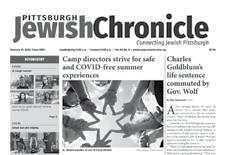










Alexandra (Alex) Lily Kutz-Flamenbaum, daughter of Rachel and Josh Kutz-Flamenbaum, will be called to the Torah to become a bat mitzvah on Saturday, Feb. 8, 2025, at Rodef Shalom Congregation. Alex’s simcha is celebrated by her older sister, Rosemary, grandparents Bob and Catherine Flamenbaum and Pat and Archie Kutz, and her entire extended family. Alex is in seventh grade at Shady Side Academy. She’s proud to be an active member of that community, deeply enjoying both academics and athletics. Alex’s bat mitzvah project draws on both her love of building and creating as well as her deep sense of empathy for children suffering from housing insecurity. Alex is asking friends and family to donate items that she will use to create activity kits for kids. She’s donating these kits to children at local shelters.

With pride, joy and gratitude to Hashem, Yisroel and Devorah (Elizabeth “Liz” Klein) Weitman of Miami Beach, Florida, are delighted to announce the birth of their daughter, Bluma, on Thursday, Jan. 16, 2025. Proud grandparents are Lynn and Milton Klein of Sewickley, Pennsylvania. Bluma is also the granddaughter of the late Yosef and Rochel Weitman, ob”m. Bluma is named in loving memory of her paternal great-grandmother Bluma Weitman, ob”m, of Israel.

Kristi Karsh of Wexford and Ralph Karsh of Pittsburgh are delighted to announce the engagement of their daughter, Alison Rose Karsh to Logan Richard Burdwood, son of William and Barbara Burdwood of Wexford. Ali is the granddaughter of the late Claryne and Joseph Karsh of Highland Park and the late Hope Powell King of Valencia, and John C. King of Cranberry Township, Pennsylvania. Logan is the grandson of Mary Langlois and the late Roger Langlois of Limerick, Maine, and the late Beverly and Richard Burdwood of Westbrook, Maine. Ali is a graduate of the University of Cincinnati and a senior design thinking strategist at Eaton. Logan is a graduate of the University of Pittsburgh and the University of Maine and works as a project Manager at Civil and Environmental Consultants, Inc. A summer 2025 wedding is in the works. PJC





To be a Jew is to know vulnerability. From the moment when Bnei Yisrael stood at the edge of the Red Sea, trapped between Pharaoh’s army and the unknown depths, we have carried the weight of uncertainty, displacement and danger. Yet, time and again, we have not only survived but prevailed. From exile to oppression, from wandering to rebuilding, ours is a story of resilience.
Vulnerability is an intricate web of emotions, each thread tied to a different fear or insecurity. It’s that moment when you step into a room full of strangers, when you don’t know the language, or when you’re surrounded by a culture that feels alien. It’s the quiet anxiety of being “the new one,” or the sting of loneliness that creeps in when you’re not quite connected yet.
But what if vulnerability, despite its discomfort, is also a doorway? A space where growth happens, where we learn more about ourselves and others? Is it possible that our most vulnerable moments could lead to our most profound transformations?
After centuries of enslavement, the people of Israel are thrust into the unknown, their chains broken but their hearts knotted with confusion and dread. Freedom from the iron grip of Egyptian taskmasters may cost them dearly. They have witnessed a series of terrifying events — the plagues that ravaged the land, the oppressive darkness that swallowed the sky, and the haunting visitation of the invisible God of Moses, apparent in the death of the nation’s firstborn males, human and animal alike.
Now, as they stand on the threshold of freedom, these newly released slaves are confronted with unsettling thoughts. Why this circuitous route instead of the direct path to safety? Who is this invisible God demanding their trust, a deity they have never truly seen or known? And who are these leaders who speak with such conviction, guiding them through a wilderness that seems as much psychological as physical? The desert looms before them — its silence deafening with oppressive stillness. Here, they grapple with the most fundamental questions: Where are we going? Who will sustain us? And above all, how will we survive without the most agonizing but still familiar comforts we’ve left behind?
Parshat Beshelach opens with the Israelites leaving Egypt, and in the third verse, Exodus 13:18, we read:
Now the Israelites went up out of the land of Egypt.

What is this word,

What does it mean about how the newlyreleased Israelites will go up out of the land?

The word is generally interpreted as “armed” or “equipped,” suggesting that the Israelites left Egypt prepared for battle.


However, its meaning is not entirely clear, and has stumped generations of scholars, as far back as Rashi. Multiple interpretations have arisen to explain this mystery over time. The one that speaks most strikingly to me is from ancient Akkadia where the Akkadian cognate means “belly.” This interpretation clearly implies vulnerability. So by using this word, , our verse suggests that the Israelites departed feeling exposed or frail.
There is a powerful midrash that reflects Bnei Yisrael’s vulnerability after leaving Egypt, comparing them to a dove being pursued by a hawk. Mechilta d’Rabbi Yishmael describes how the Israelites, despite witnessing miracles, felt terrified and exposed at the Red Sea:
“To what were the Israelites comparable at that moment? To a dove that was fleeing from a hawk and entered a cleft in the rock, where a snake was lurking. If it entered, the snake would bite it; if it left, the hawk would seize it. So too, the Israelites — if they looked back, Pharaoh was there; if they went forward, the sea was before them.”

This midrash illustrates absolute vulnerability. B’nai Yisrael are cornered, terrified and powerless. They have just escaped bondage, but now they face death from two sides: Behind them, Pharaoh’s army and the source of their traumatic past, chases after them. In front of them is the Red Sea, an uncrossable abyss that threatens their very tenuous survival. They go up out of the land of Egypt /vulnerable/bellies exposed, like a dove being chased by a hawk. This midrash helps us understand their gut-wrenching fear — the moment when freedom was like another kind of helplessness. This is the way the text portrays them going up out of the land of Egypt.

The Israelites had no weapons, no clear path and no certainty — only faith and fear. And how does the God of Moses respond to their fear? God says rather sternly that the only way out is through (Shemot 14:15). And so the story goes. B’nai Yisrael successfully cross through the sea and eventually make it to the Promised Land. But do B’nai Yisrael endure despite their vulnerability, or because of it? Perhaps the very experience of being /vulnerable strengthens their resolve, deepens their faith and binds them together as a people.
Jewish history is a testament to this parable of vulnerability and strength. Time and again, our people have faced uncertainty and existential threat, yet these moments contribute to forging our resilience. Whether wandering the wilderness, rebuilding after destruction, or reclaiming sovereignty in the Land of Israel, we have not only survived but thrived. So, perhaps our endurance is not in spite of our vulnerability, but because of it. Because of it, we have learned to adapt, to hold fast to our identity and to build a future even in the face of the worst adversity. The story of the Jewish people is not merely one of survival, but of determination, faith, and the unwavering belief that no matter the challenge, we rise.
PJC
Rabbi Kara Tav is a Pittsburgh-based educator, chaplain and counselor. This column is a service of the Greater Pittsburgh Jewish Clergy Association.
ACKERMAN: Sidney Ackerman, age 90, of Fishers, Indiana, formerly of Carroll Twp., Pennsylvania, and Mt. Lebanon, Pennsylvania, passed away on Jan. 29, 2025. Sidney was born in McKeesport, Pennsylvania, in 1934, son of the late Sara and Nathan Ackerman. Along with his wife, Sidney was the proprietor of Ackerman’s Furniture in Donora for 45 years. Sidney was a member of Temple Beth Am of Monessen, Pennsylvania. Sidney was preceded in death by his wife of 64 years, Phyllis. Surviving are his sons, Dr. Bruce Ackerman (Lisa) of Carmel, Indiana, and Mark Ackerman (Sharon) of Mt. Lebanon; granddaughters, Bethanie and Brooke; grandsons, Micah and Joshua; sister, Thelma Katz (Allan) of Pittsburgh; brother-in-law, Gerald Pavloff (Yolanda) of Stahlstown and Tel Aviv, Israel. Funeral arrangements have been entrusted to the Rhome Funeral Home, 1209 Grand Blvd., Monessen. Burial was in the Temple Beth Am Cemetery, Lenity School Road, Rostraver Township. In lieu of flowers, the family requests that memorial donations be made to the Temple Beth Am Cemetery Fund. Checks may be made payable to “Temple Beth Am Cemetery” c/o Shire Law Firm, 1711 Grand Blvd., Park Centre, Monessen, PA 15062. Online condolences may be conveyed to the Ackerman family at rhomefuneralhome.com.
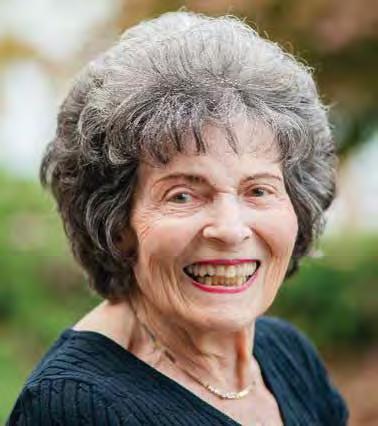
ARENSON: Adrienne (Alderman) Arenson, age 91 in Raleigh, North Carolina, formerly of Scott Township, on Monday, Feb, 3, 2025. Cherished wife of the late Nathan Arenson; beloved mother of Milton Arenson of Tarzana, California, Robbie and (Kelli) Arenson of Charlotte, North Carolina, Gwen (Arenson) and (Jason) Gelband of Raleigh, North Carolina, and the late Lisa Arenson Gillespie. Loving grandmother of Michael and (Danielle) Gillespie, Zachary Arenson, Bryce and (Monica) Arenson, Brooke Arenson, Kate Arenson, Gabrielle Kaftan, Nathan Arenson, Dylan Arenson and the late David Gillespie. Great-grandmother of Rafe Gillespie. Daughter of the late Etta and Milton Alderman, sister of Lynn Alderman of Beverly Hills, California, and the late Richard Alderman. Also survived by 13 nieces and nephews. Services will be this Thursday, Feb. 6, at Slater Funeral Home,1650 Greentree Road Pittsburgh, PA 15220. (412)563-2800. Visitation two hours prior to service, 10 a.m.-12 p.m. Graveside service following at Temple Sinai in Plum Boro. In lieu of flowers, the family requests donations to be made to The Nathan S. Arenson Fund for Pancreatic Cancer Research. Memorial contributions may be made to the University of Pittsburgh. Please mail to: Development Office, UPMC Cancer Pavilion, Suite 1B, 5150 Centre Avenue, Pittsburgh, PA 15232, and in the memo section, note “Nathan Arenson Fund.” In addition, there are other ways to make a gift. Phone: Call the main office at 412-647-4700 to make a gift with a credit card over the phone or call at 412-623-4777. Online: Make a Gift | Donate to UPMC Hillman Cancer Center Please select “Give to Cancer Research” and follow the prompts to “Other’ designation.”

BROWDIE: Leonard “Len” Browdie, on Tuesday, Jan. 28, 2025. Beloved husband of Sandy Browdie. Loving father of Daren Browdie. Brother of the late Gerald (s urviving spouse Lois) Browdie. Brother-in-law of Barbara and Ralph Garner, Allen and Stephanie Mittelman, and Marcy Giever and Sheldon Dounn. Also survived by loving nieces and nephews. Len was in the Army Reserves. He was compassionate and kind to all who knew him. He had a charismatic personality. He had a career-long sales position and had a wonderful rapport with his customers. His family was small but they were a close loving family and he adored his wife and son. He was a longlife fan of jazz music. Graveside service and interment were held at B’Nai Israel Cemetery. Contributions may be made to the Juvenile Diabetes Research Foundation, 501 Martindale Street, Suite 670, Pittsburgh, PA 15212 or Crohn’s Colitis Foundation (crohnscolitisfoundation.org) or Community Day School, 6424 Forward Avenue, Pittsburgh, PA 15217. schugar.com
EHRENPREIS: Stanley N. Ehrenpreis, 95, died peacefully in his home, on Jan. 22, 2025, when the planets were aligned. He died surrounded by his family in Lubbock, Texas, where he and his beloved wife, Lin, of 61 years, moved in August 2024 to be with family. He was born in Brownsville, raised in McKeesport and lived in Squirrel Hill for over 60 years. Stanley had many passions in his long life; family was always first. Then came inventions, music, skiing,
Anonymous
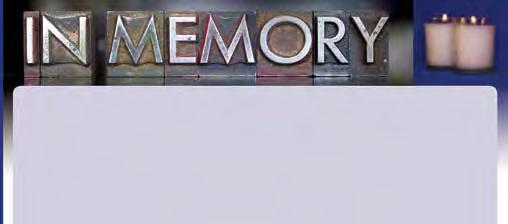
Toker
Anonymous Richard Rubenstein
Barbara Berenfield
Anonymous
Anonymous
Faye Bleiberg
Faye Bleiberg
Faye Bleiberg
Lois S. Crone
Marc Darling & Susan Denmark
Stephanie Glick
Stephanie Glick
Edward M. Goldston
Robert & Kathleen Grant
Cheryl Kalson
Amy R. Kamin
Jeff Kaplan
Carl Krasik
Lawrence F. Leventon
Amy C. Lowenstein Frank
Bernice & Jack Meyers
Robert & Judi Miller
Mal & Ann Powell
Richard, Mindy, & Logan Stadler.
Anne D. Rosenberg
David & Susan Rosenberg
Lois & Ira Rubin
Sunday February 9: Joseph Baker, Rebecca Belkin, David Allen Bertenthal, Helen Citron, Max Elinoff, Jennie Greenberger, Rachel Grinberg, Maurice J. Ives, Minnie S. Kopman, Sylvan A. Mendlovitz, Wallace Norman, Ciril Perer, Manuel Regenstien, Anna Gross Rosen, Jacob Rosenberg, Jacob Rosenzweig, Merle Nancy Scolnik, Pearl Sheckter, Morris Singer, Herman Smith, Eleanor Goldberg Toker
Monday February 10: Ethel Graff Braun, Moses Brown, Brenda Cramer Miller, Sarah A. Epstein, Anna C. Feigus, Minnie Feldman, Max Green, Meyer Grossman, William Gusky, Jesse L. Kann, Samuel Karp, Ida A. Leff, Fannie London, Samuel Robins, Ethel Ruben, Louis Samuels, Belle Sokolow, Sidney Stark, Louis B. Stein, Irvin H. Tapper, Phyllis Weiner Unger, Ida Winer, Morris Wolk
Tuesday February 11: Jacob Bahm, Barbara Berenfield, Jack Hart, Helen Betty Israel, Edward Josephs, Pearl Karp, David Kart, Diane L. Katz, Anna Lazier, Marian Levine, Belle Wise Levy, Joseph G. Luptak, Erna Metzger, Beverly Pattak, Morris Roth, Mollie Simon, Samuel Sloan, Max Spodek, Herman Spolan
Wednesday February 12: Irving Glicken, Morris Goodman, Mollie Greenfield, Harry Gruskin, Clara Ida Harris, Esther Mankovitz, Martha Rogal, Edgar Schaffel, Harry D. Wald
Thursday February 13: Esther Berkman, Harry A. Cohan, James H. Darling, Ida S. Goldberg, Jacob J. Gordon, Sidney Hyde, Walter E. Katz, Carl Labovitz, Nathan Labe Land, Ludwig Landman, Sheldon G. Lindner, Philip Rosenthal, Harry Shapiro, Jennie Shrager, David Silverblatt, Minnie Rhea Silverblatt, Jennie Sobel, Dorothy Spolan, Annie Stearns, Julius Wolf
Friday February 14: Jacob Adler, Ida Alpert, Simon Bostocky, Frumie Fraidel Brown, Eva Cohen, Mollie Hilsenrath, Michael Hoffrichter, Helen Honig, Nathan H. Leventon, Esq., Daniel Levinson, Rebecca Luick, Dorothy Pollock, Elaine Portner, Leon Prinz, Mollie Ryave, Max Schoenberger, Enoch Sisselsky, Benjamin W. Steiner
Saturday February 15: Hyman Browarsky, Louis Fishman, Ethel Golanty, Morris D. Herwitt, Hyman Klahr, David Lundy, Isadore Lupovitz, Joseph Markovitz, Lew J. Miller, Isadore Pachtman, Milton Ripp, Eunice Roth, Lena G. Skirble, A. Leonard Winer, Ivan Lee Wolinsky


























Estate of Armand J. Pistilli Sr. a/k/a Armand J. Pistilli, Deceased April 9, 2024, of Lincoln, Pennsylvania No. 02-24-04918 Catherine M. Pistilli, Executrix; 218 Harbinger Ridge Road, Harbinger, NC 27941 or to Bruce S. Gelman, Esquire, Gelman & Reisman, P.C., Law & Finance Bldg., 429 Fourth Avenue, Suite 1203, Pittsburgh, PA 15219 Jewish Association on Aging


Continued from page 19
golf, camping (tents to RVS), and auctions (junk to fine arts). He graduated from Pitt, served in the Air Force during the Korean conflict and retired as a captain. He was a 32nd degree Mason, played in the Syria Shrine Band and was a founding member of the JCC Orchestra. He enjoyed his career with Westinghouse Electric, where he had several patents related to nuclear reactors. Stanley is survived by his loving wife, Lin, and his daughter, Amie Duemer (Alex Garza) in Lubbock and his son, and best friend, Andrew Ehrenpreis (Dulce Andrade Ehrenpreis) from Brooklyn, and his beloved grandchildren: Joshua Duemer (Alex Kirby), Isaiah Ehrenpreis, Willem Duemer, Armany Andrade (Kristina Reyes), Alexis, Arielle and Annika Garza. Preceded in death by his parents, Abraham and Rose Ehrenpreis, his grandson, Josef Duemer, and his sisters, Eileen Sheer and Gege Lazer. He is also loved dearly by his nieces and nephews: Debbie Haverson (Michael), Patti Sheer (Bob Conley), Sally Lazer and Bill Sheer (Ana). In lieu of flowers, Stanley wanted donations to go to the South Plains Kidney Foundation, where his daughter is the executive director: South Plains Kidney Foundation (SPKF), P.O. BOX 65356, Lubbock, Texas 79464, SouthPlainsKidney.org. Stanley loved the huge blue sky and the bright stars at night in Texas and was laid to rest in Lubbock, Texas. He wanted us all to: “Take it easy, enjoy life and show empathy.”
GOODMAN: Adam R. Goodman died in Ojochal, Costa Rica, on Jan. 15, 2025, at the age of 43. He was the son of Cindy and Mark Goodman and the brother of Rebecca (Jake) Maine and Emily (Taylor Bright) Goodman. Adam was the uncle of Penelope and Eleanor Bright. Adam was born and raised in Squirrell Hill. He attended Shady Side lower school, Sterrett Academy and Valley Forge Military Academy. At Valley Forge he played clarinet in the Regimental Band, captained the rifle team and commanded an operations section. After two years at WVU he moved west and earned his associate’s degree in welding at the






“Storms don’t last




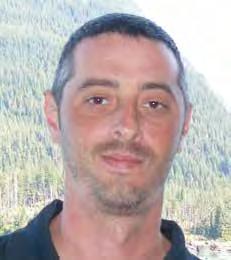
College of Siskiyous. He owned “A Dam Good Man’s” handyman service in Weed, California, organic farmed in Happy Camp, California, welded in San Diego, and was a nondestructive testing (NDT) inspector in San Diego and in Seattle, Washington. His NDT work led him to teach in China and to celebrate his 35th birthday on the Great Wall of China. He loved the outdoors, camping, fishing, hunting and he was an enthusiastic gun collector and marksman. His final move was to Costa Rica seeking a less stressful lifestyle. He purchased and developed Casita del Sol, a small yoga retreat in the lower hills of southwest Costa Rica. He developed a wide group of friends and was well respected by the community. He leaves a legacy of “A Big Heart.” Cremation and a memorial tree planting took place in Ojochal, Costa Rica, on Jan. 22, 2025. Contributions in his memory can be made to Pittsburgh Cure Sarcoma, PO Box 194, Gibsonia, Pa 15044, or online at: Pittsburghcuresarcoma.org (click Donate) or a charity of your choice.
ROTEMAN: Joel Roteman, 87, passed away peacefully on Jan. 27, 2025, in Pittsburgh. Born on March 5, 1937, in Pittsburgh, Joel lived a life filled with love, laughter and dedication to his family, career and passions. A proud graduate of Peabody High School in 1955, and Duquesne University in 1964 with a Bachelor of Arts degree, Joel pursued a career that combined his love of storytelling and community. As the editor of the Jewish Chronicle, he found immense joy in his work, traveling to different countries and meeting fascinating people. His sharp wit and penchant for humor were hallmarks of his personality — he always had a story to tell, a wisecrack to share, or a pun (good or bad) to lighten the mood. When asked how he was doing, his signature response was always an enthusiastic, “I’m great!” Joel proudly served his country as a member of the U.S. Army during the Korean conflict and was honorably discharged in 1964. Outside of work, Joel found joy in simple pleasures. He enjoyed tennis, poker and bowling, and was a bridge life master. Above all else, Joel’s greatest love was his wife, Micki. Together for over 60 years as best friends, partners and soulmates, they shared an unbreakable bond that inspired everyone who knew them. They were inseparable until the end, with Joel’s deepest wish being for Micki’s happiness and well-being. The family extends their heartfelt gratitude to the staff at Asbury Heights for their compassionate care and kindness toward both Joel and Micki during their time there. Micki, daughter Phyllis and son Dan ask that in lieu of flowers or cards, donations be made in Joel’s name to the Asbury Foundation at 700 Bower Hill Road, Pittsburgh, PA 15243. Joel will be remembered for his humor, warmth and unwavering devotion to those he loved. May his memory bring comfort to all who knew him. Arrangements entrusted to Ralph Schugar Chapel, Inc. schugar.com



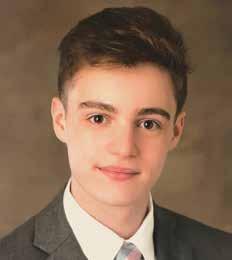
WEISS: With profound sadness, we announce the sudden death of Benjamin William Weiss on May 30, 2024. Benji, only 23 years old, was tragically hit by a car and died while legally walking across a street. Our beloved Benji, so deeply missed by his loving family and devoted friends, is remembered as an articulate, passionate, and creative person with a quick wit and wide-ranging interests. Music, theatre, writing, and Dungeons and Dragons were just a few of his passions. Benji loved learning in so many different fields, from popular culture to mythology. Benji was strongly committed to the well-being and rights of the LGBQT community. Benji, who grew up in Pittsburgh, is profoundly and forever missed by his father Jim Weiss, mother Vered LewyWeiss, his brother, Michael Weiss, and by Benji’s favorite adorable dog, Addison. Extended family and many friends have shared treasured memories and stories about Benji, with abundant tears and laughter. A Celebration of Life service for Benji will be held in the Spring of 2025. If desired, the family suggests donations to Paws across Pittsburgh (pawsacrosspittsburgh.com), The Trevor Project (TheTrevorProject. org), or any charity of your preference. Benji will forever burn brightly in our hearts. May his spirited life and memory be a blessing to all who knew him. Arrangements entrusted to Ralph Schugar Chapel, Inc. schugar.com
WEISS: Bernard Jacob Weiss, PhD, on Jan. 28, 2025. Beloved husband of 41 years of Beverly Nero. Loving father of Rebecca Weiss and Rachel Weiss. Brother of Phyllis Abend of Boston, Massachusetts, and May (Walter) March of Chicago, Illinois. Grandfather of Bridget McCrum. Also survived by nieces and nephews. Dr. Weiss was a professor of history at Duquesne University for 45 years and was a former chairman of the History Department. Graveside service and interment were held at Homewood Cemetery. In lieu of flowers, contributions may be made to the Gumberg Library at Duquesne University (duq.edu/giving/). Arrangements entrusted to Ralph Schugar Chapel, Inc. schugar.com PJC



















By Penny Schwartz | JTA
By day, sisters Molly and Clara appear to be modern-day New Yorkers, living in an indie cinema that was once home to a Yiddish theater. At night, they transform into estries — owl-like women vampires who prey on men. Molly and Clara — whose alter egos are based on figures from Jewish lore — are the heroines of “Night Owls,” A.R. Vishny’s time-travel debut novel, one of a trio of books that took top prizes at the Sydney Taylor Book Awards for Jewish children’s books.
The awards were announced Monday by the Association of Jewish Libraries at the American Library Association’s LibLearnX conference in Phoenix.
“Night Owls” won the gold medal for young adult fiction. “An Etrog from Across the Sea” by Deborah Bodin Cohen and Kerry Olitzky, illustrated by Stacey Dressen McQueen, took the gold medal in the picture book category, and “The Girl Who Sang: A Holocaust Memoir of Hope and Survival,” by Estelle Nadel and Bethany Strought, with illustrations by Sammy Savos, won top prize in the middle-grade category.
Set in the early 18th century, the lavishly

illustrated “An Etrog from Across the Sea” tells the story of a Sephardic Jewish family living in Colonial-era New York. A young girl named Rachel is worried when her father, a tradesman, doesn’t return home from Corsica in time for Sukkot. It’s based on the life of Luis Moises Gomez, a real-life British merchant who settled in New York.
Co-author Olitzky is a former pulpit rabbi and former executive director of Big Tent Judaism, an outreach institution.
“The Girl Who Sang” is based on the life of the Polish-born Nadel, who survived the Holocaust as a child hiding from the Nazis.
The novel’s protagonist’s passion for singing becomes her source of strength, through the tragic loss of her family, her arduous post-war escape and a complicated life as a young refugee in the U.S.
In other awards, Hanna R. Neier won the Sydney Taylor manuscript award for “When You Write Back,” time-travel novel layered in mystery. The award honors unpublished manuscripts of Jewish fiction targeting ages 8-13.
Winners will receive their awards at the AJL’s annual conference in June.
Writing about “Night Owls,” Vishny said
that estries can be traced to Sefer Hasidism. The medieval text describes estries as witchlike creatures called who suck the blood of their victims.
Vishny lays the blame for their obscurity, along with most other Jewish magical creatures, on the systematic, antisemitic destruction of European Jewish culture, Vishny wrote.
“We’re a tiny people whose culture our enemies have long sought to destroy,” she wrote.
The gold medal for “Night Owls” was its second major award this month. Earlier it won a National Jewish Book Award in the young adult category. Other Jewish children’s books to win National Jewish Book Awards, a progam of the Jewish Book Council, were “Sharing Shalom” by Danielle Sharkan, illustrated by Selina Alko, in the picture book category and “Finn and Ezra’s Bar Mitzvah Time Loop” by Joshua S. Levy for middegrade readers.
Named in memory of Sydney Taylor, the author of the “All-of-a-Kind-Family” series of young adult books, the Association of Jewish Libraries awards honor works that “exemplify high literary standards, while authentically portraying the Jewish experience,” Aviva Rosenberg, chair of the Sydney Taylor awards committee, said at the ceremony. PJC
Village is the
Juniper Village at Forest Hills provides everything you’ll need to enjoy an active and healthy lifestyle at an affordable price without the expense of a large buy-in fee. You’ll find us comparable to an apartment complex with all the privacy you desire. Here at Juniper, we’ll pamper you with conveniences such as delicious meals, housekeeping, entertainment, transportation, care services, and most of all friendships.

The Pennsylvania Cyber Charter School (PA Cyber) welcomed students and families in Warrendale for a Holocaust Remembrance Day event. The Jan. 27 event enabled participants to watch the premiere of “Perseverance” and learn about Holocaust survivor Melvin Goldman. Following the film, attendees enjoyed a question and answer session with Goldman’s daughter, author Lee Goldman Kikel.
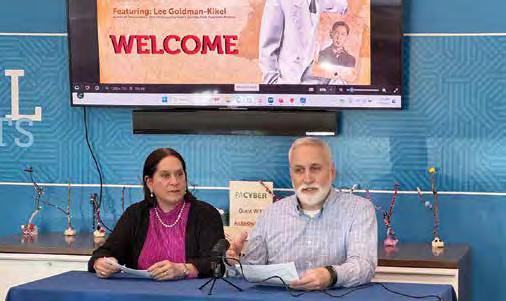
Before competing against Shady Side Academy, members of Hillel Academy of Pittsburgh’s 5/6 girls basketball team called attention to the hostages still remaining in Gaza.



Palling around at Prizmah
Pittsburgh Jewish day school educators joined 1,000 professionals and lay leaders for three days of learning and collaboration in

Generational remembrance
Chabad House on Campus worked with Jewish students at the University of Pittsburgh to host a Holocaust remembrance ceremony. The Jan. 27 program welcomed students and administrators from Pitt, as well as local politicians.

